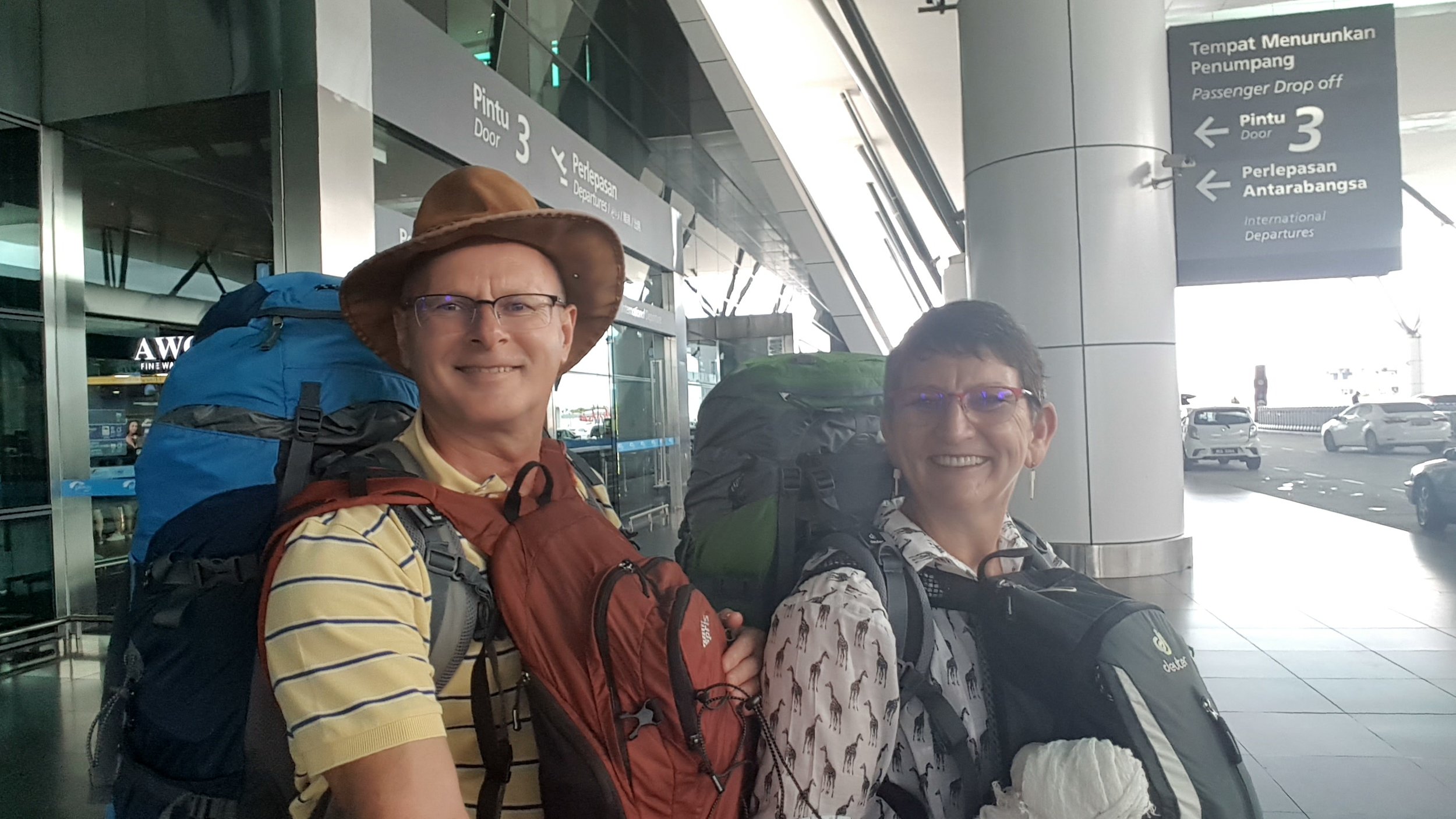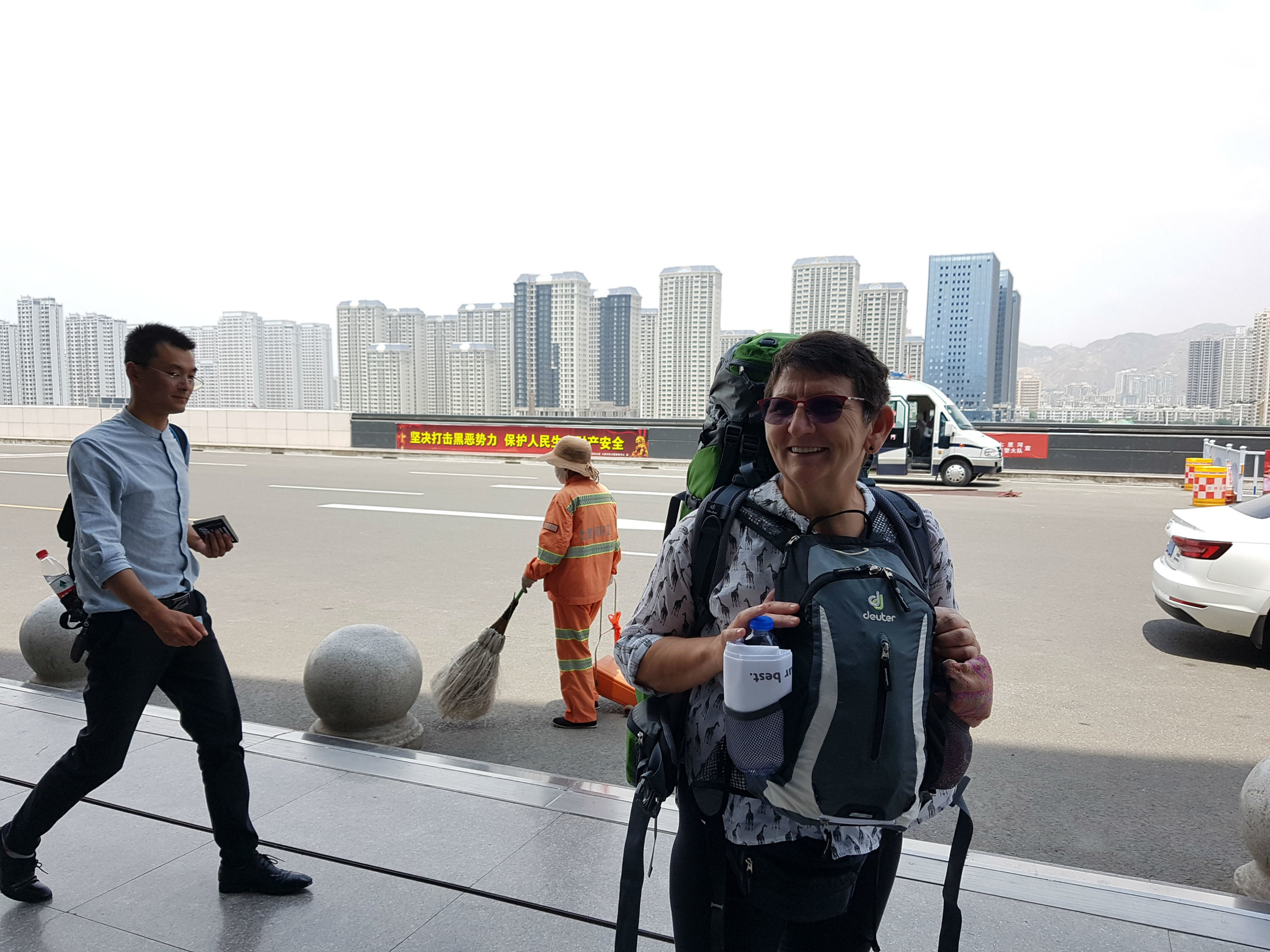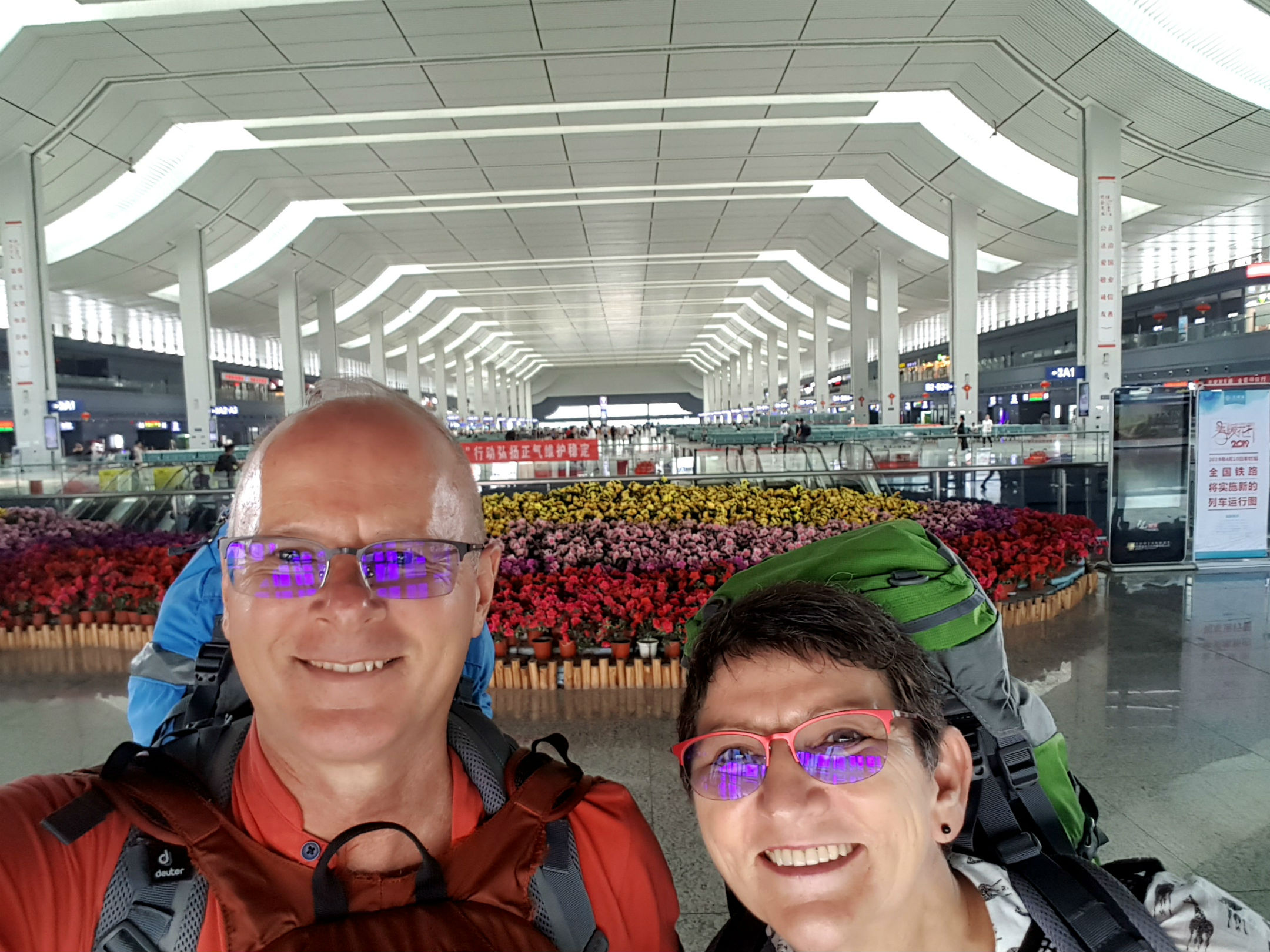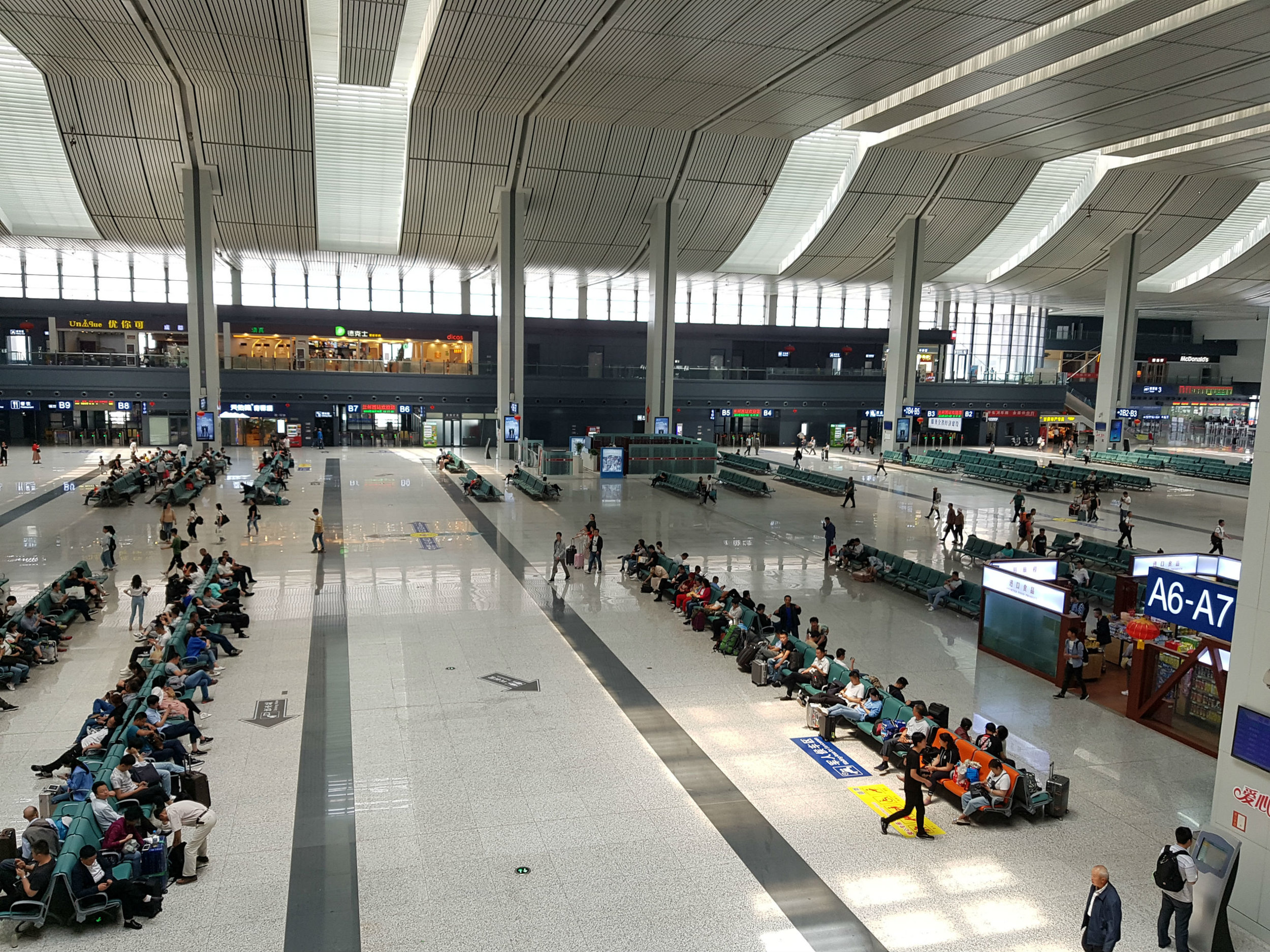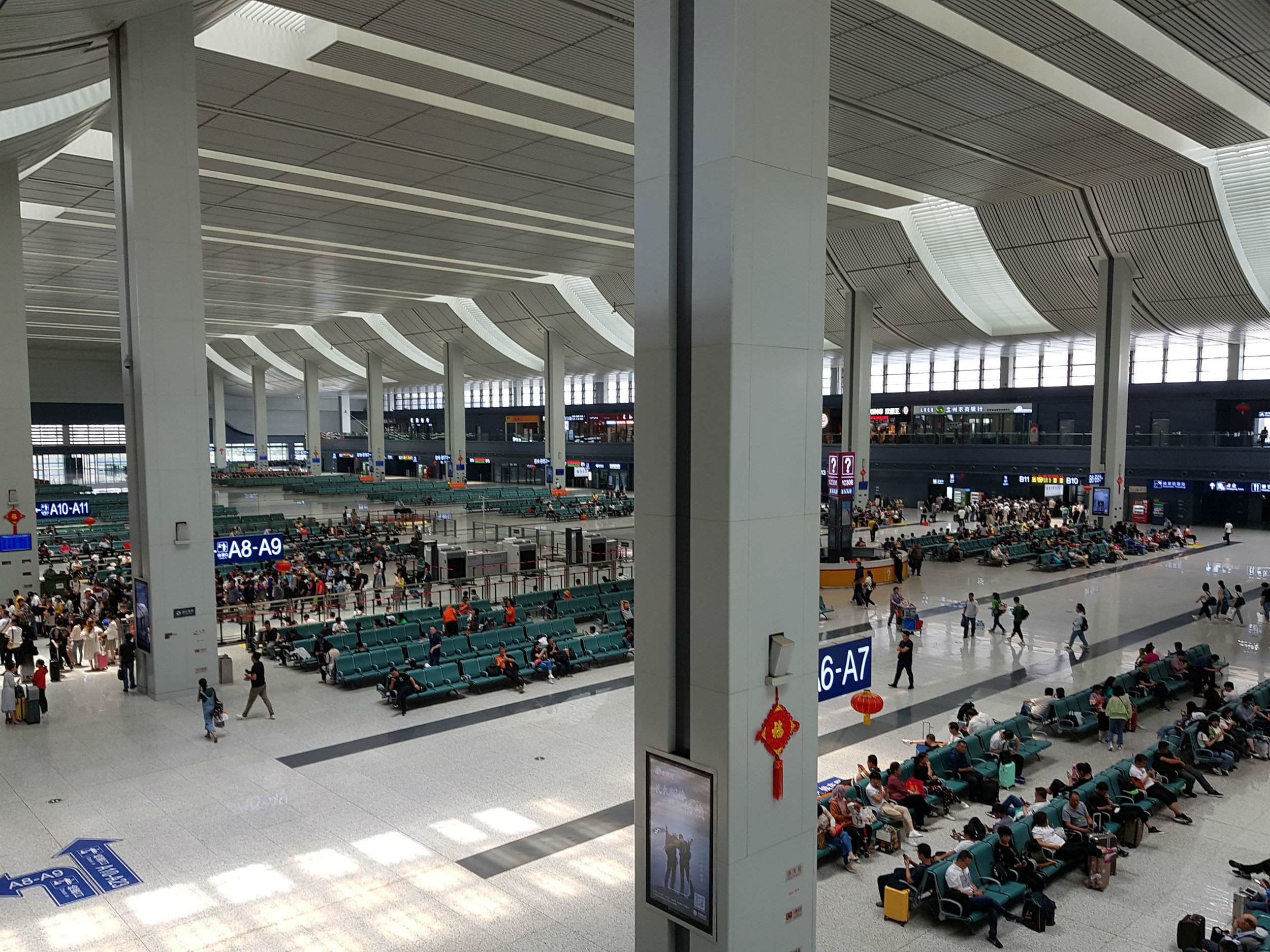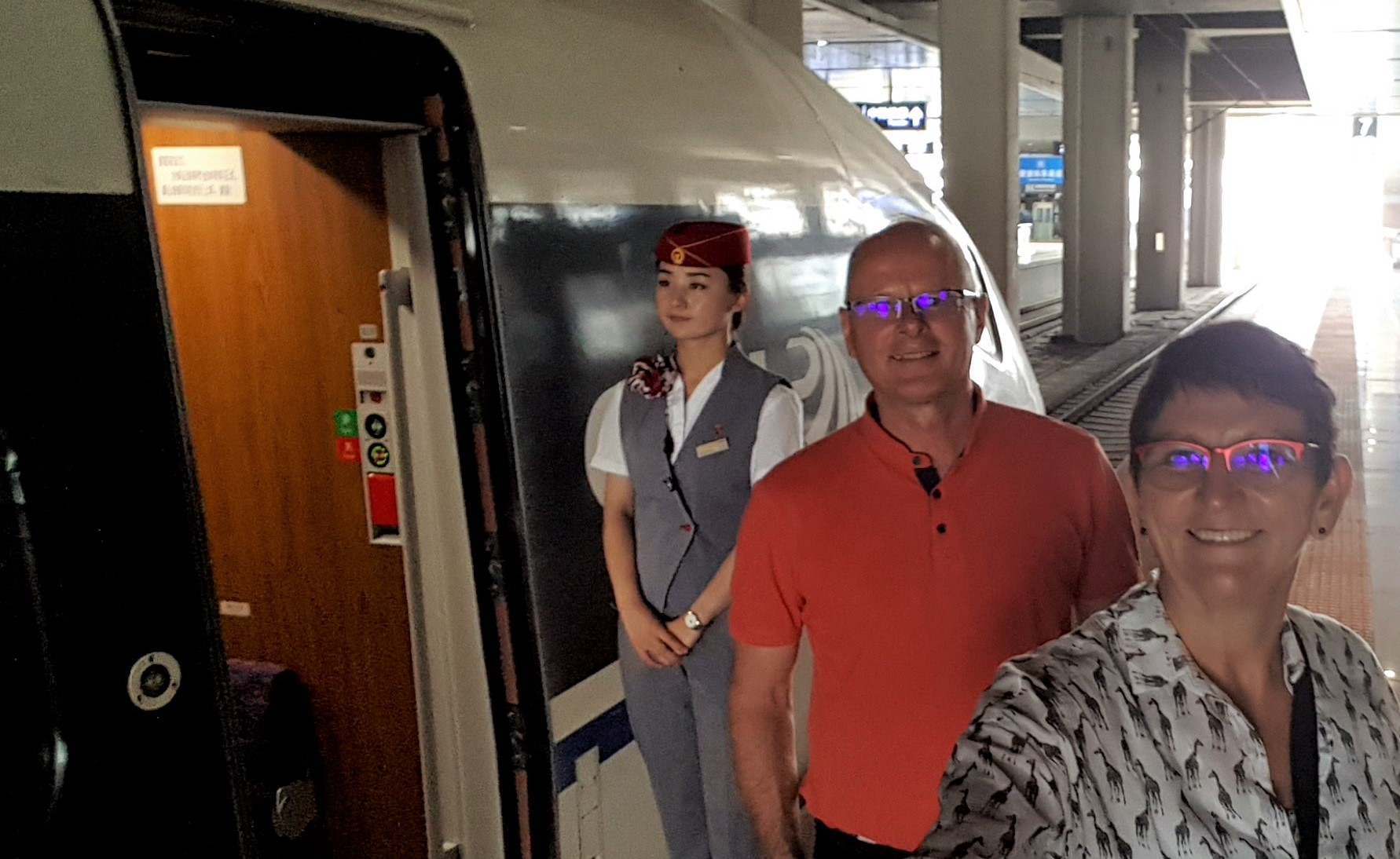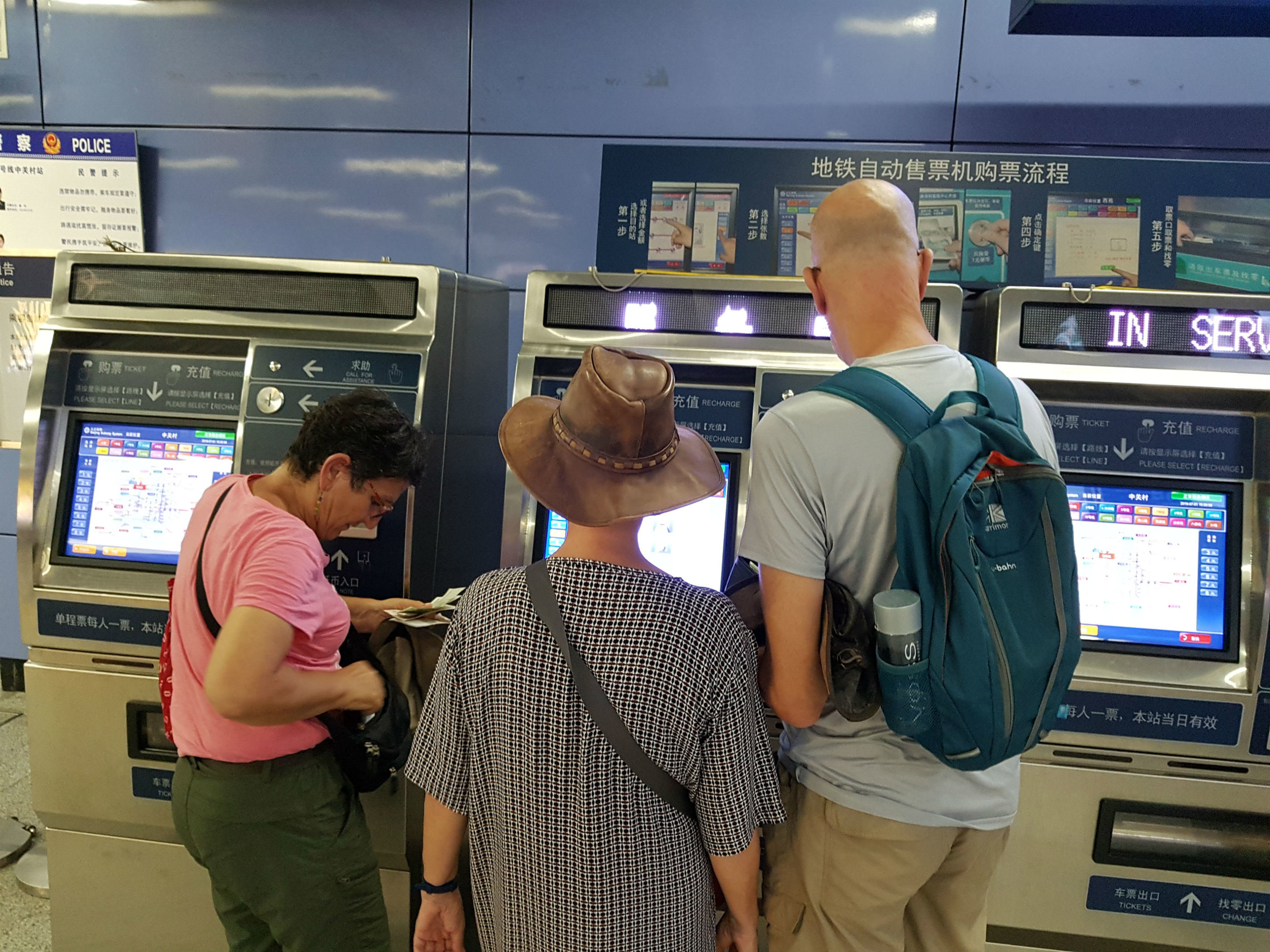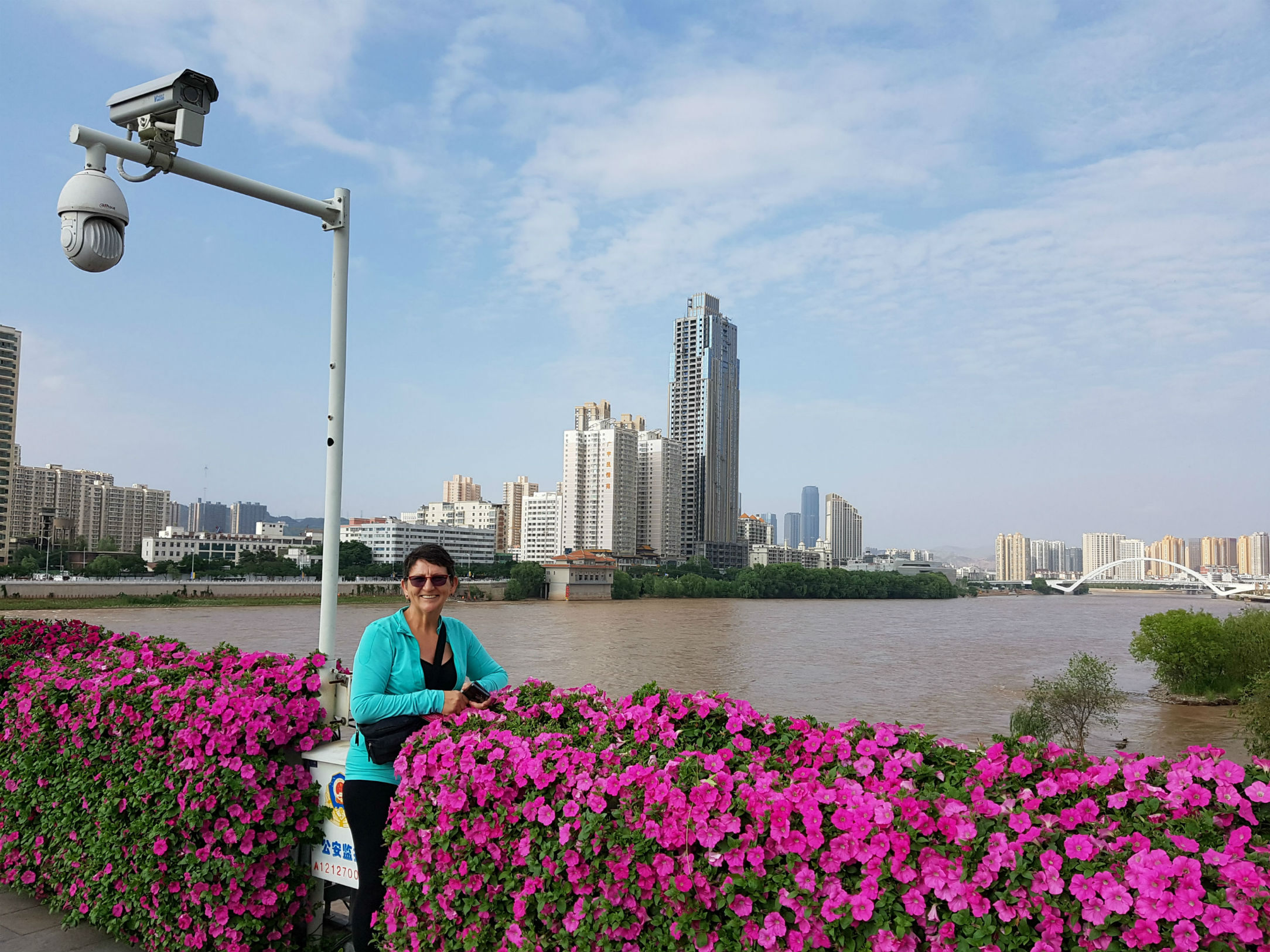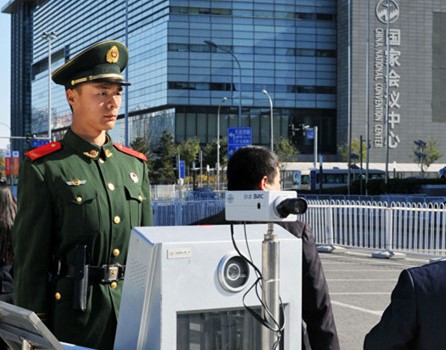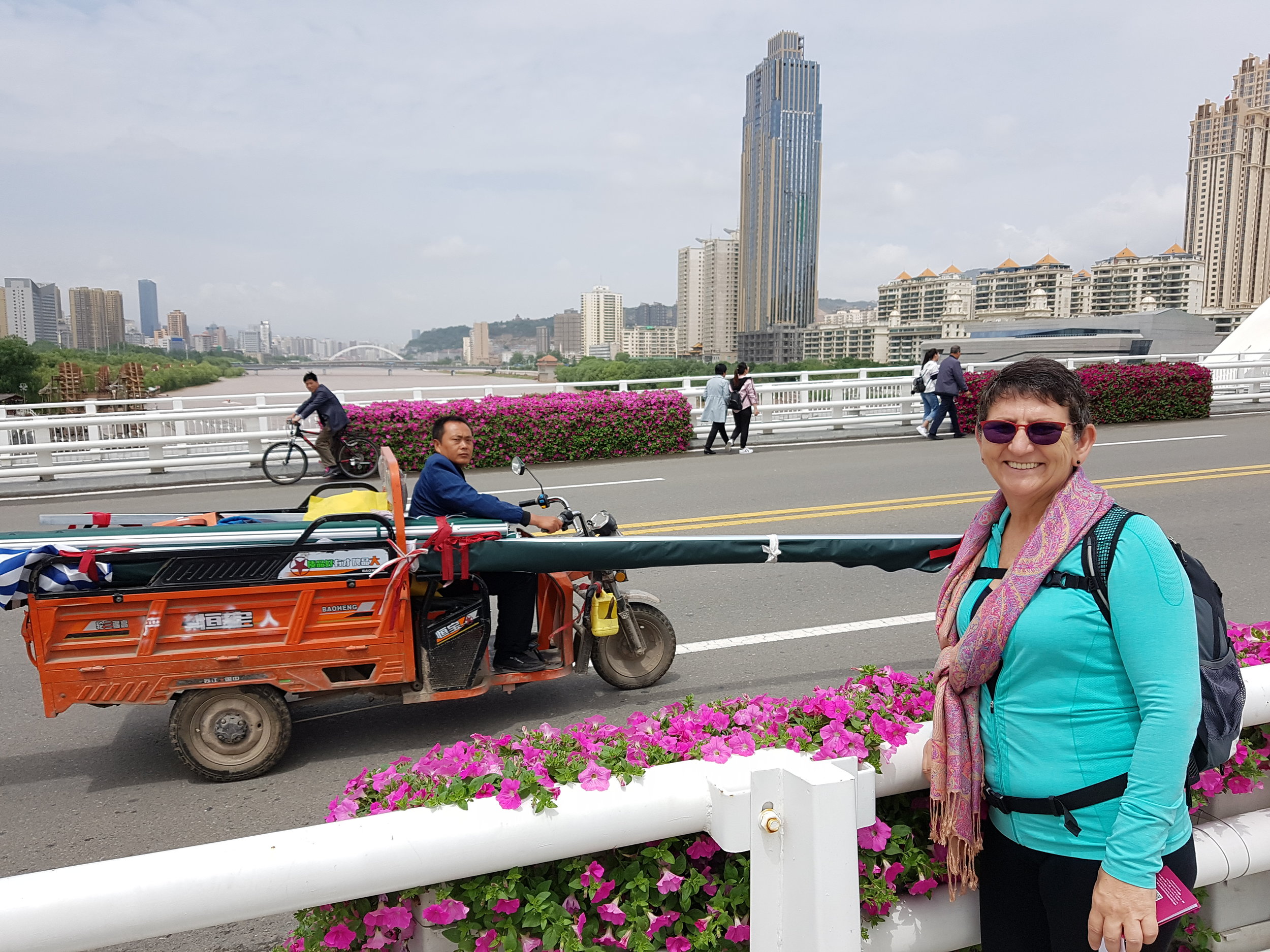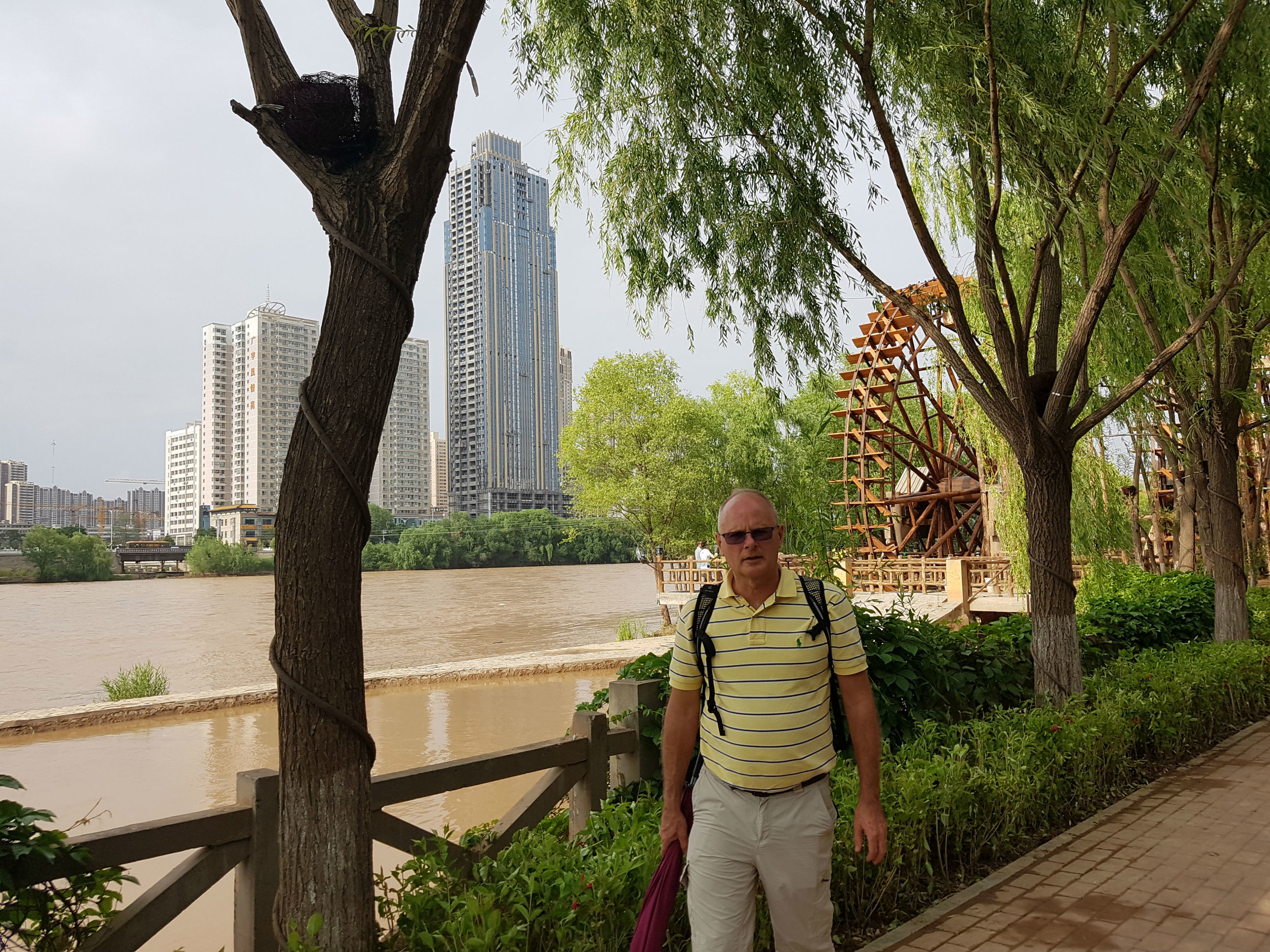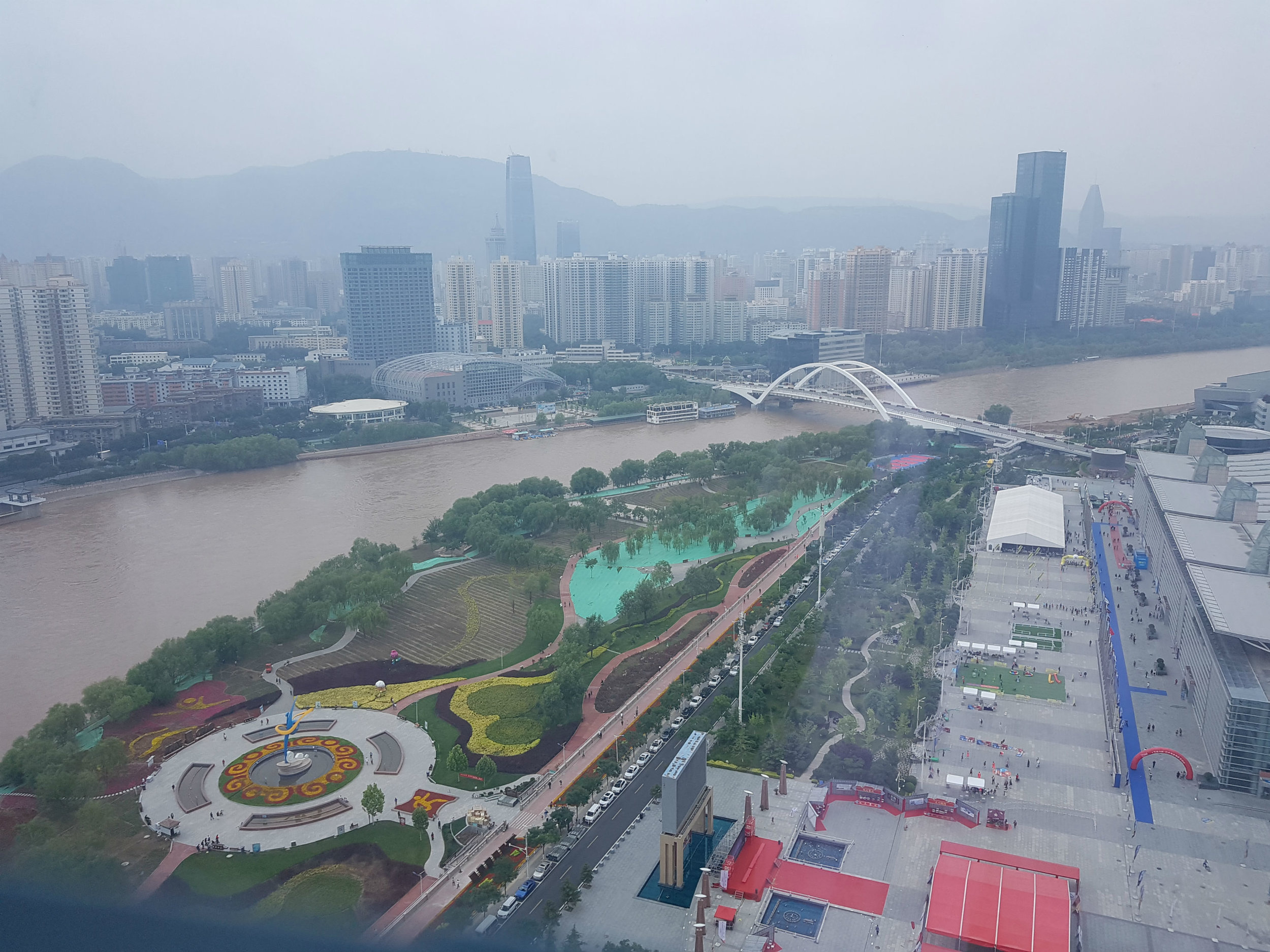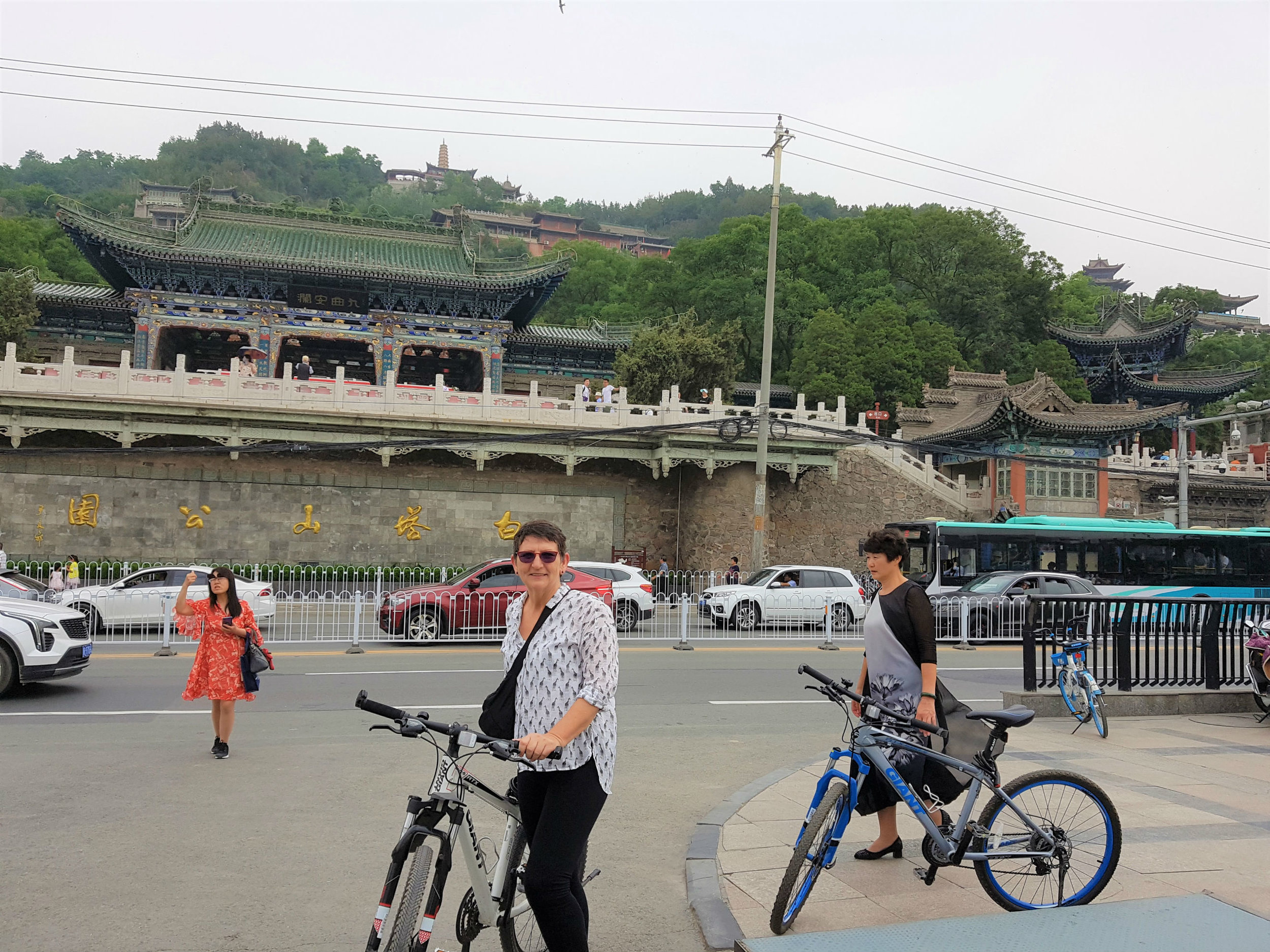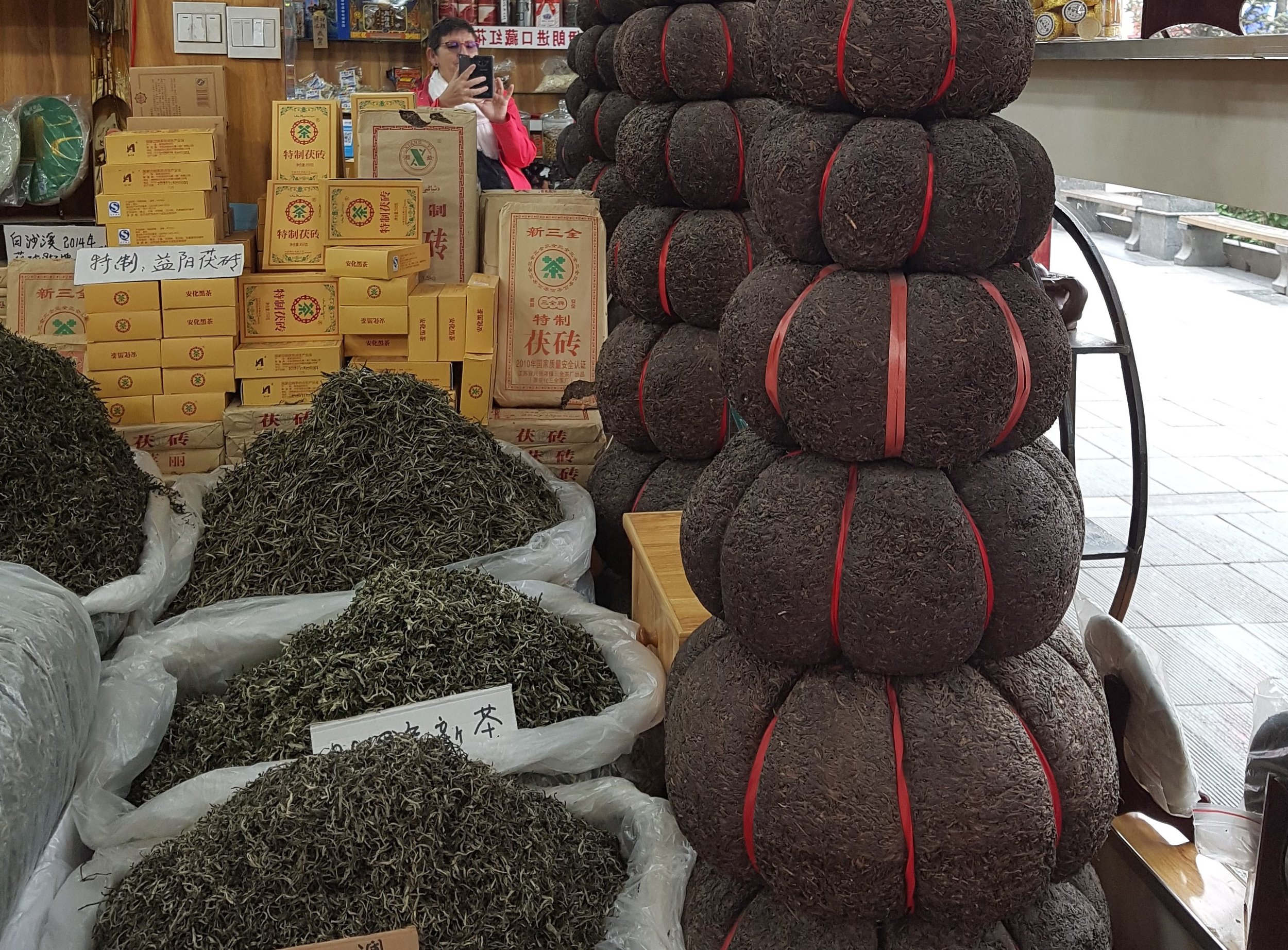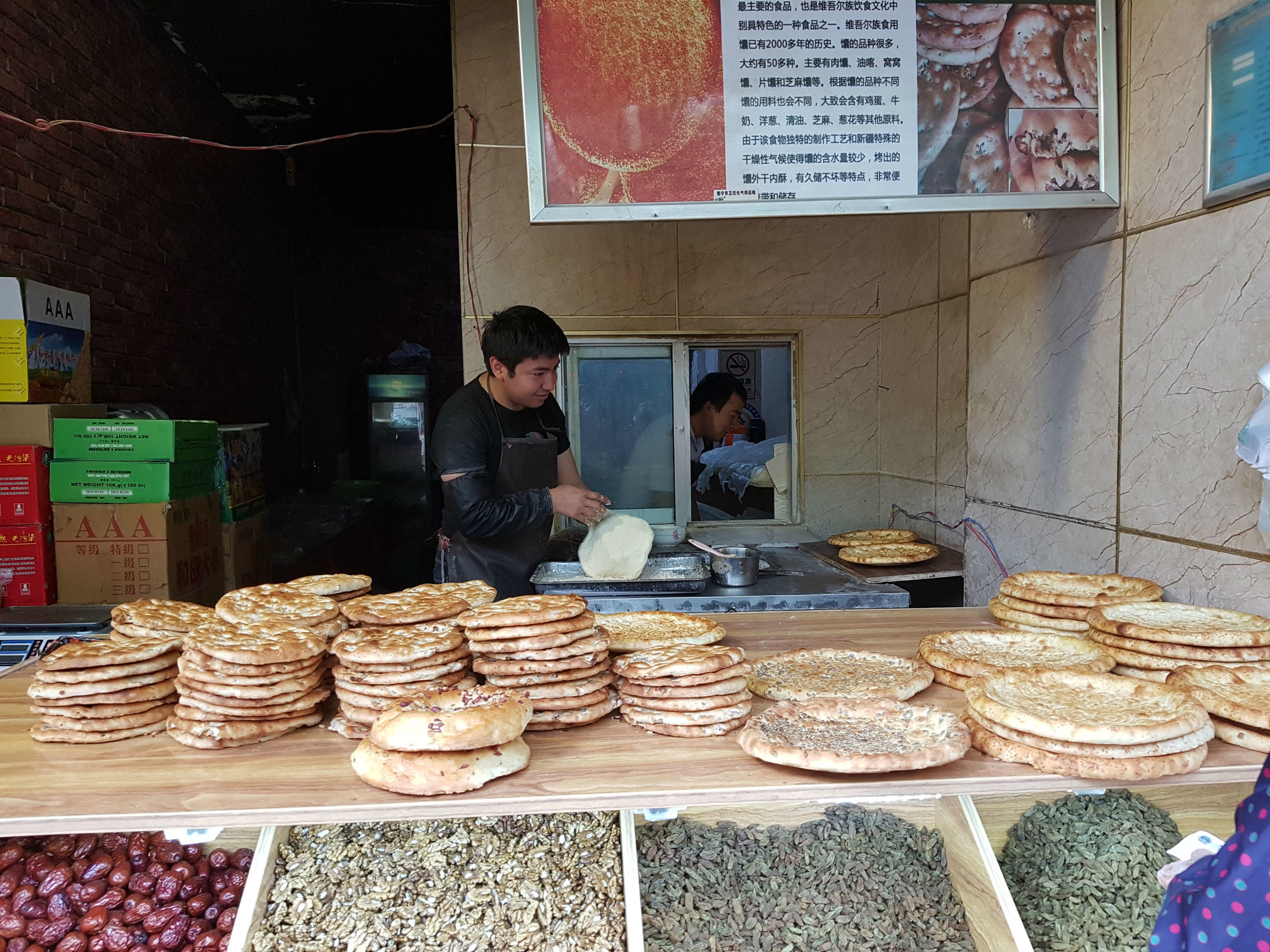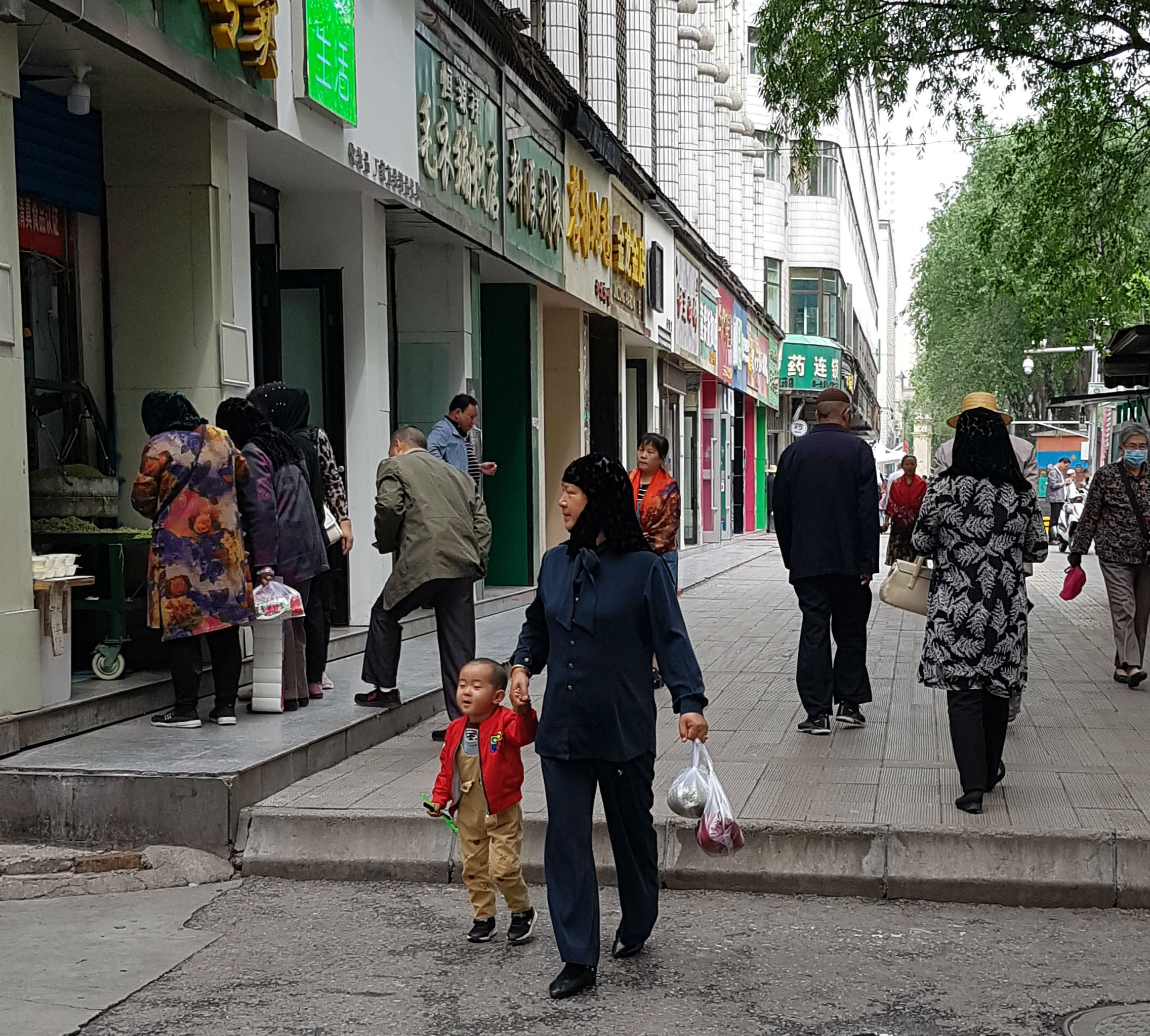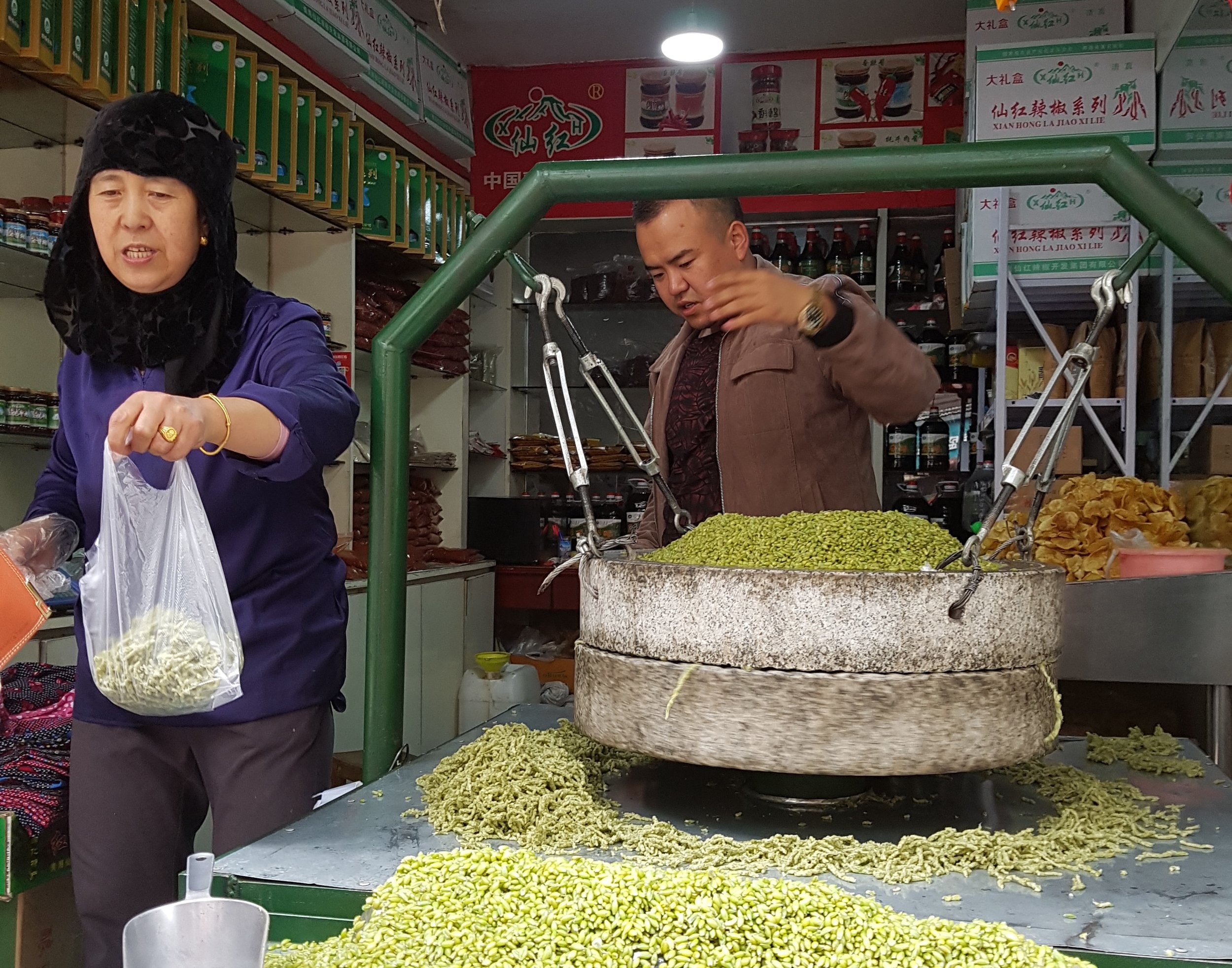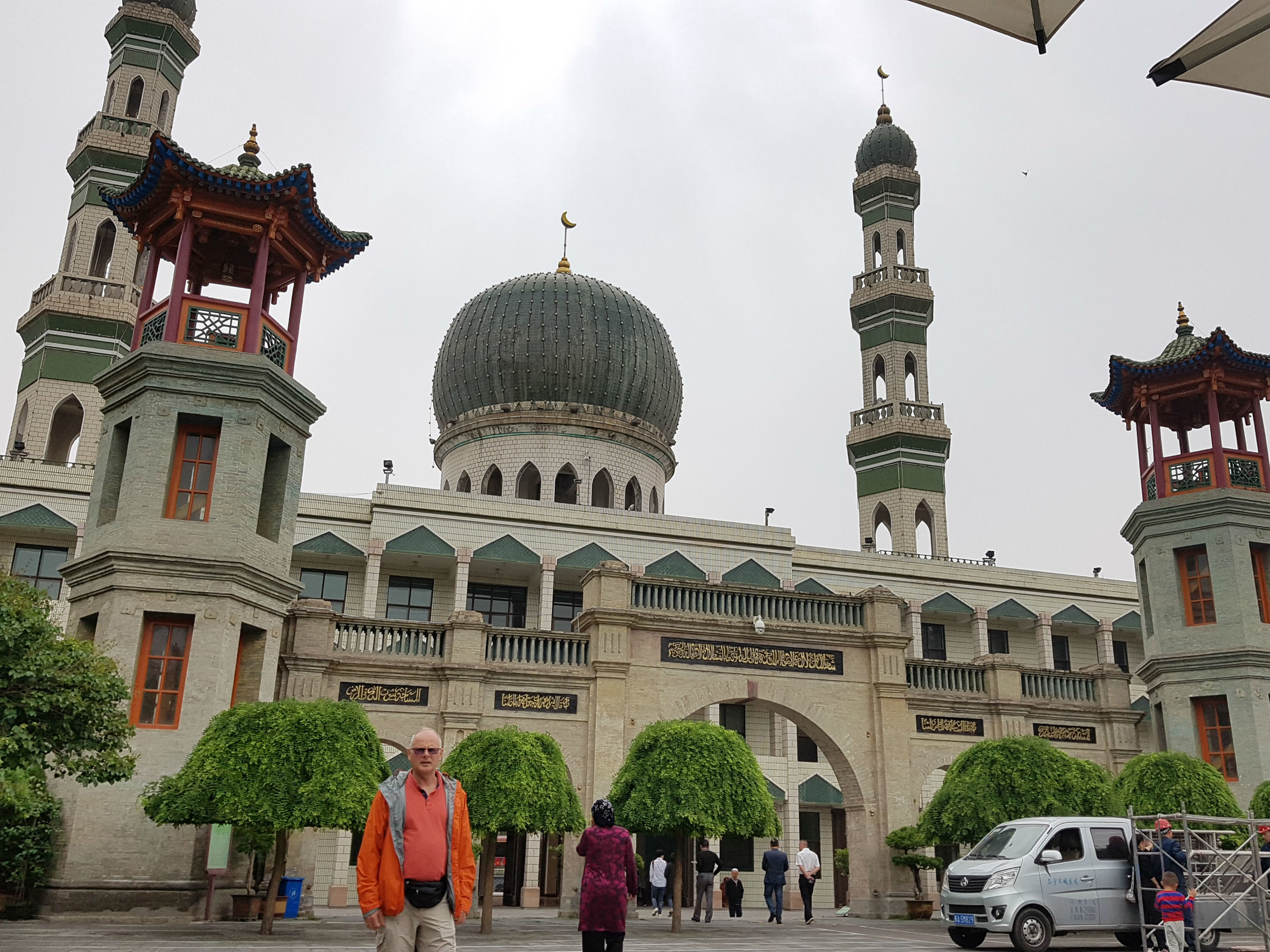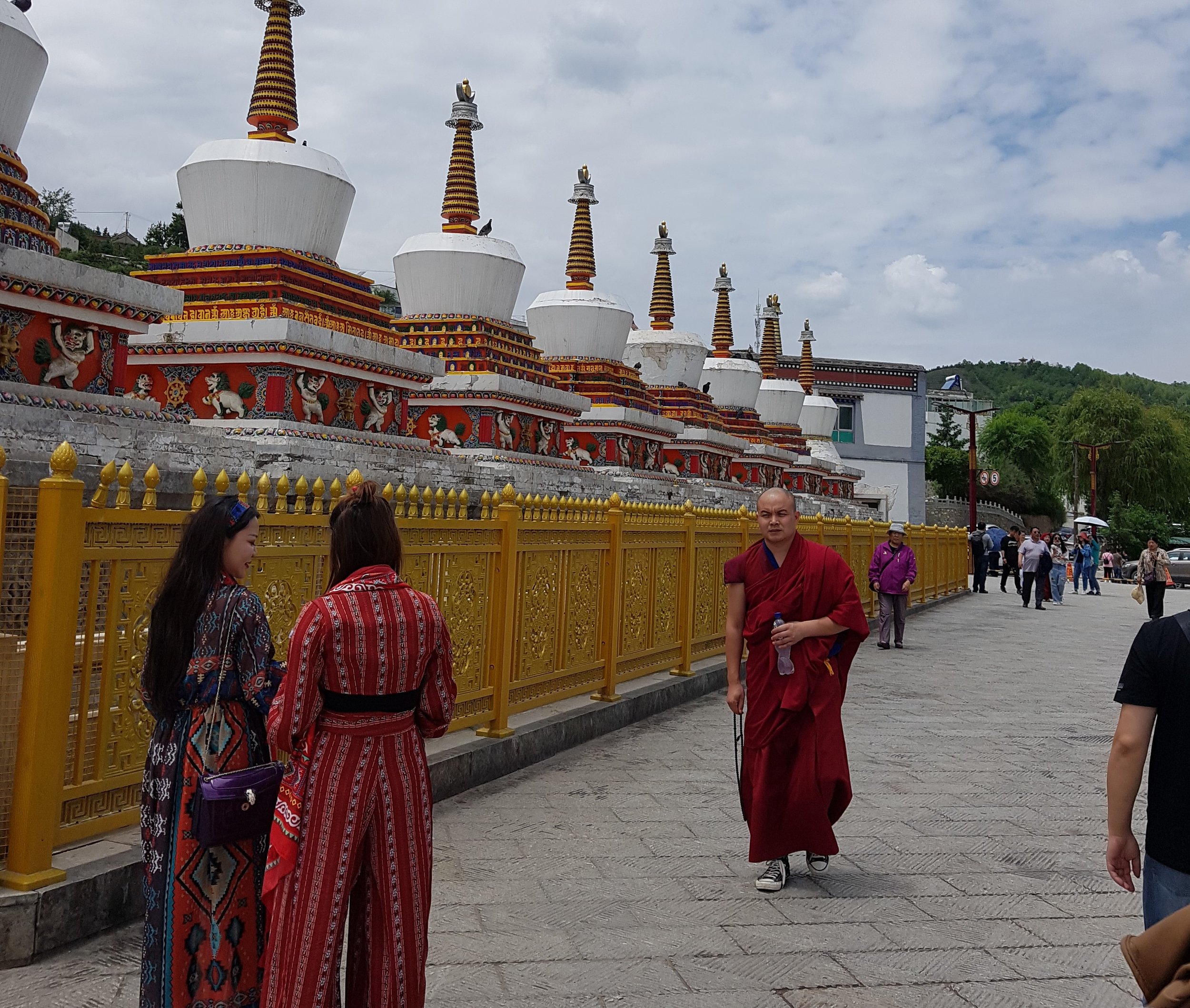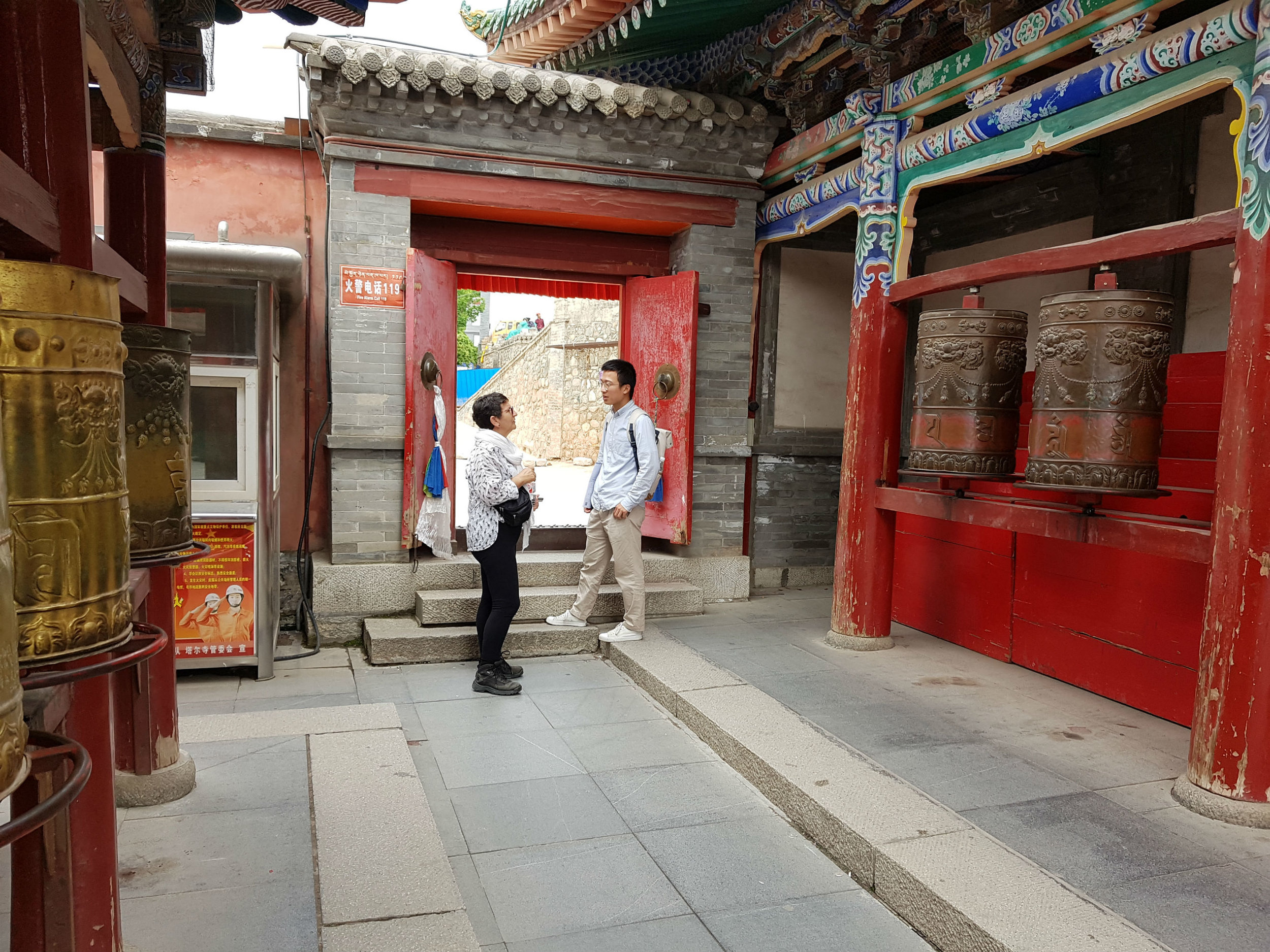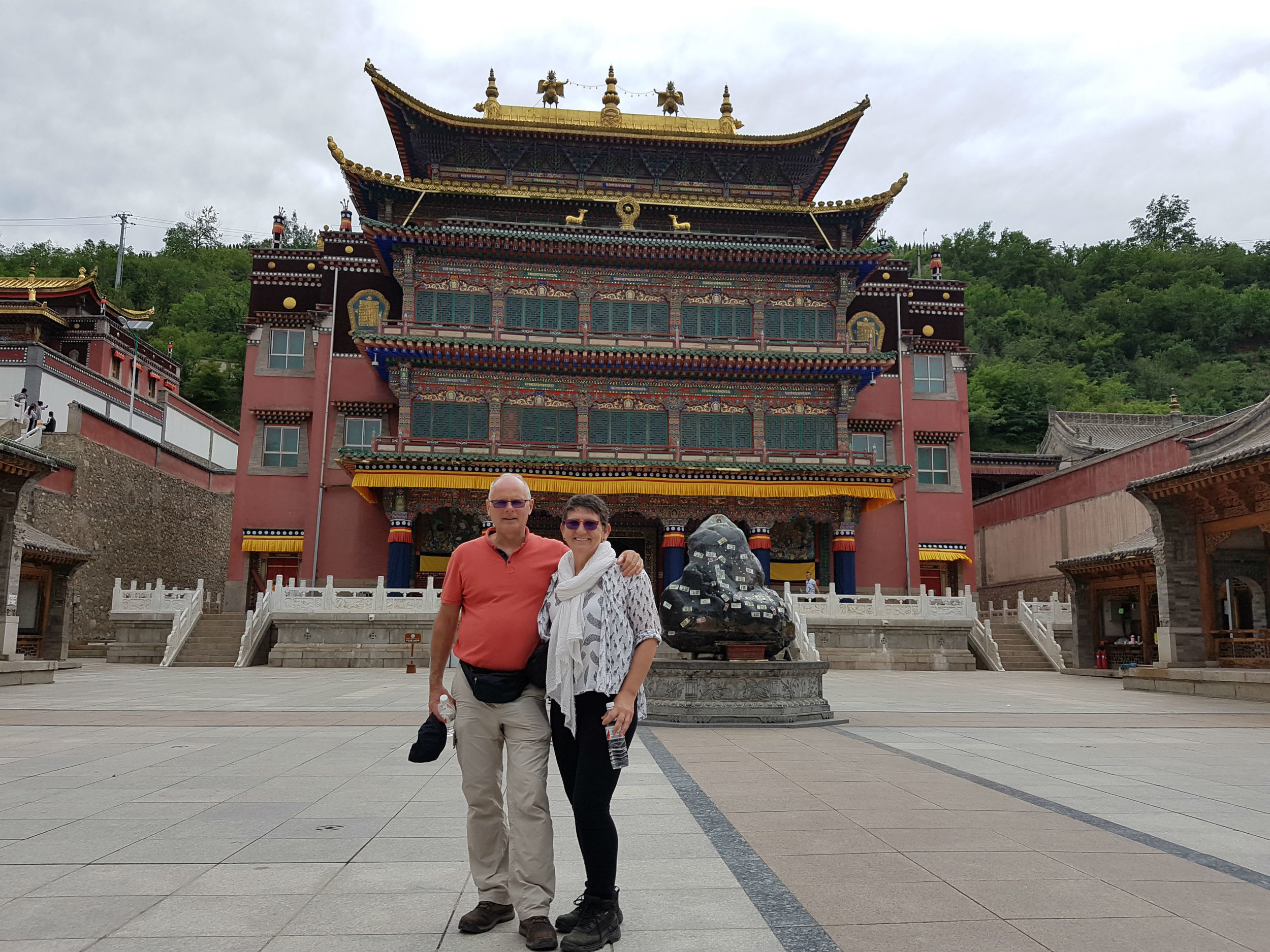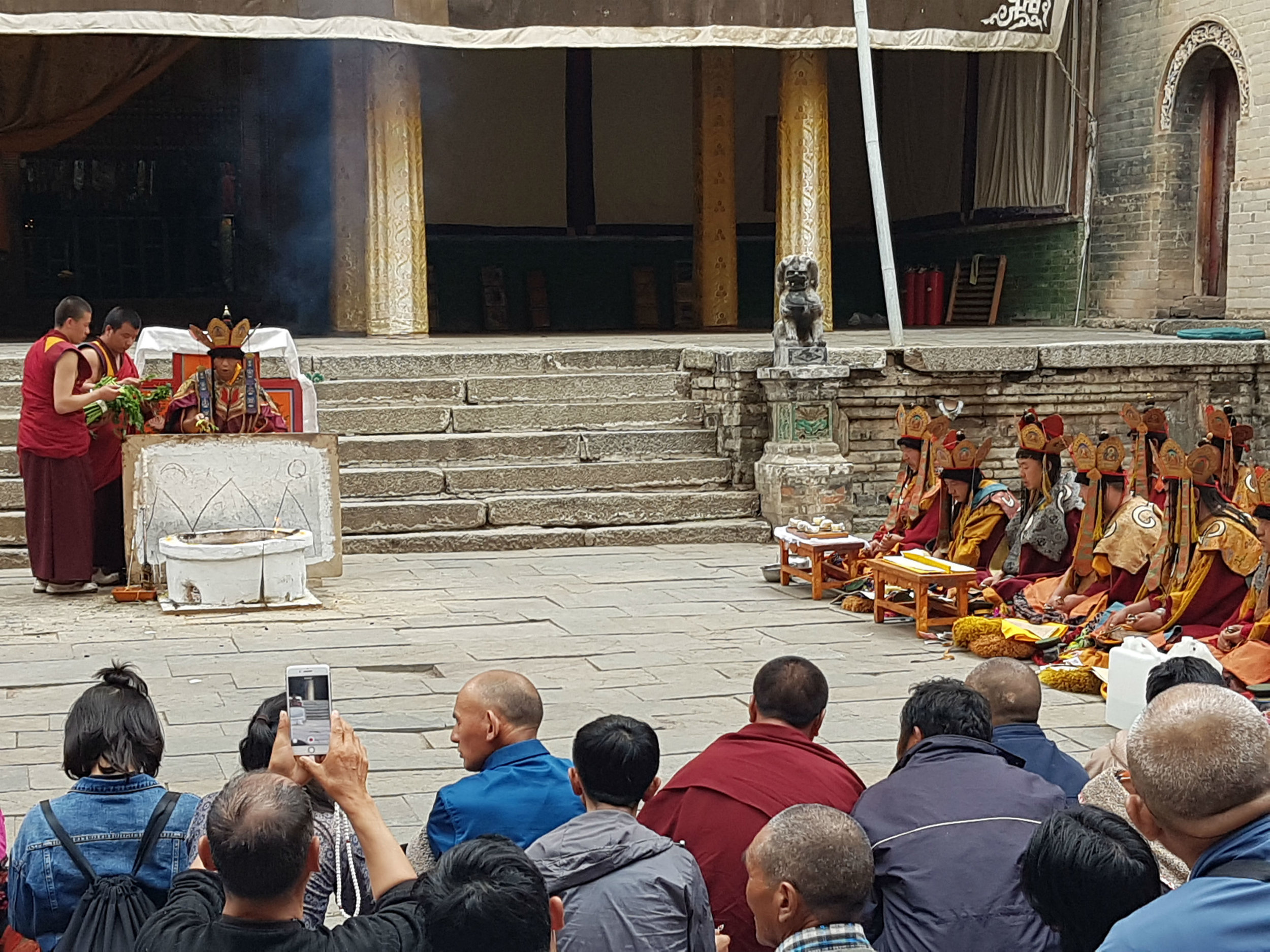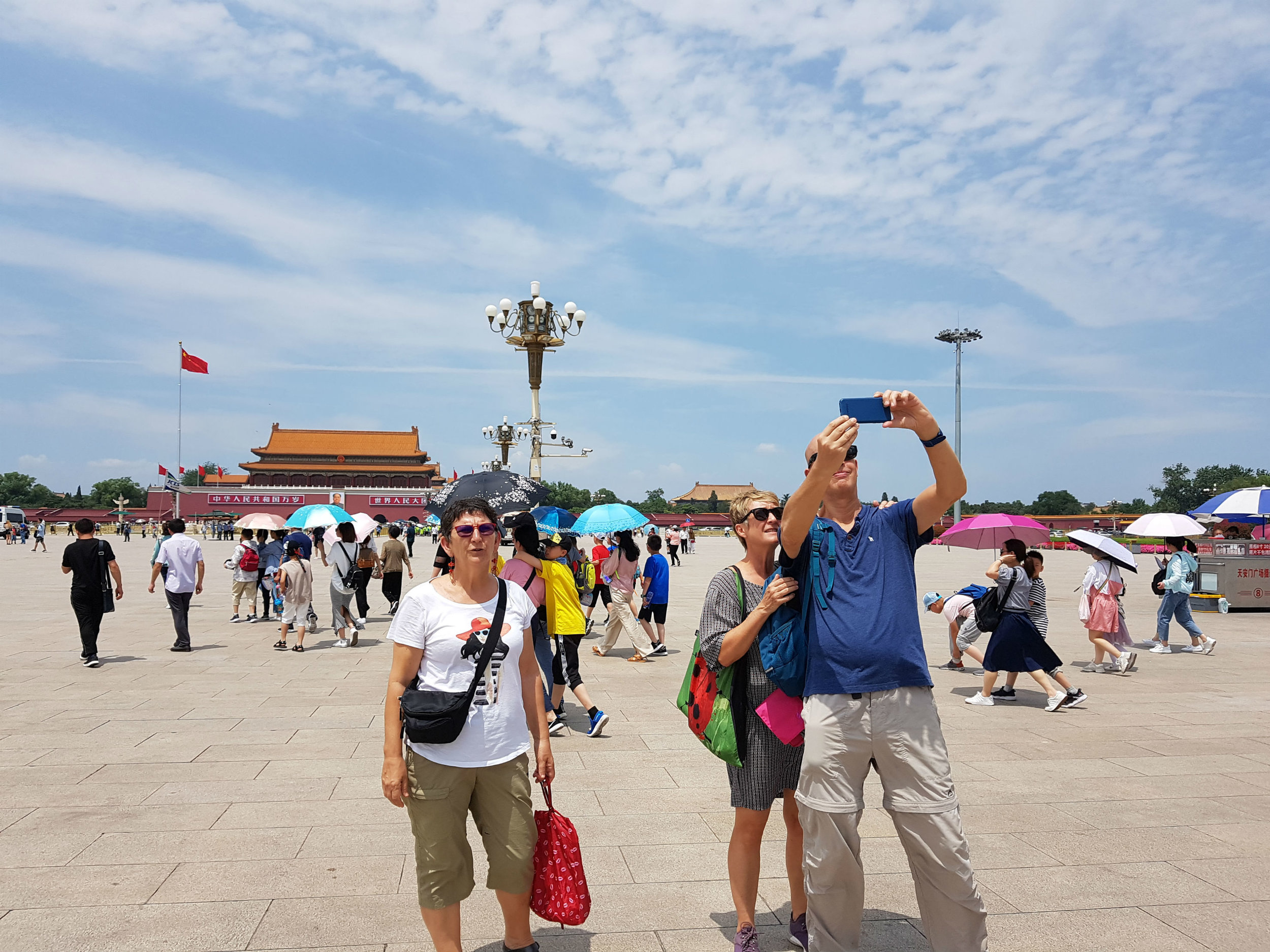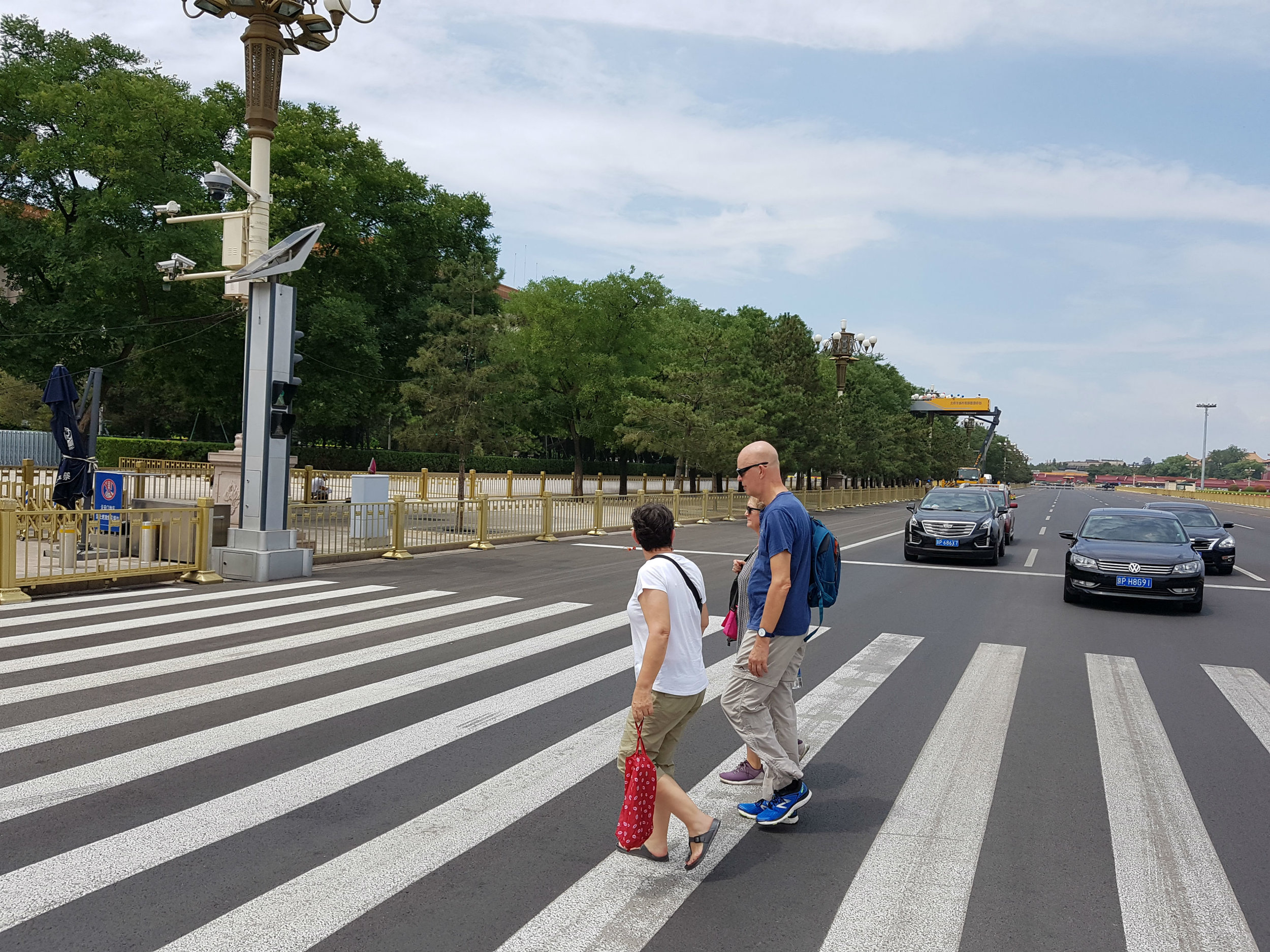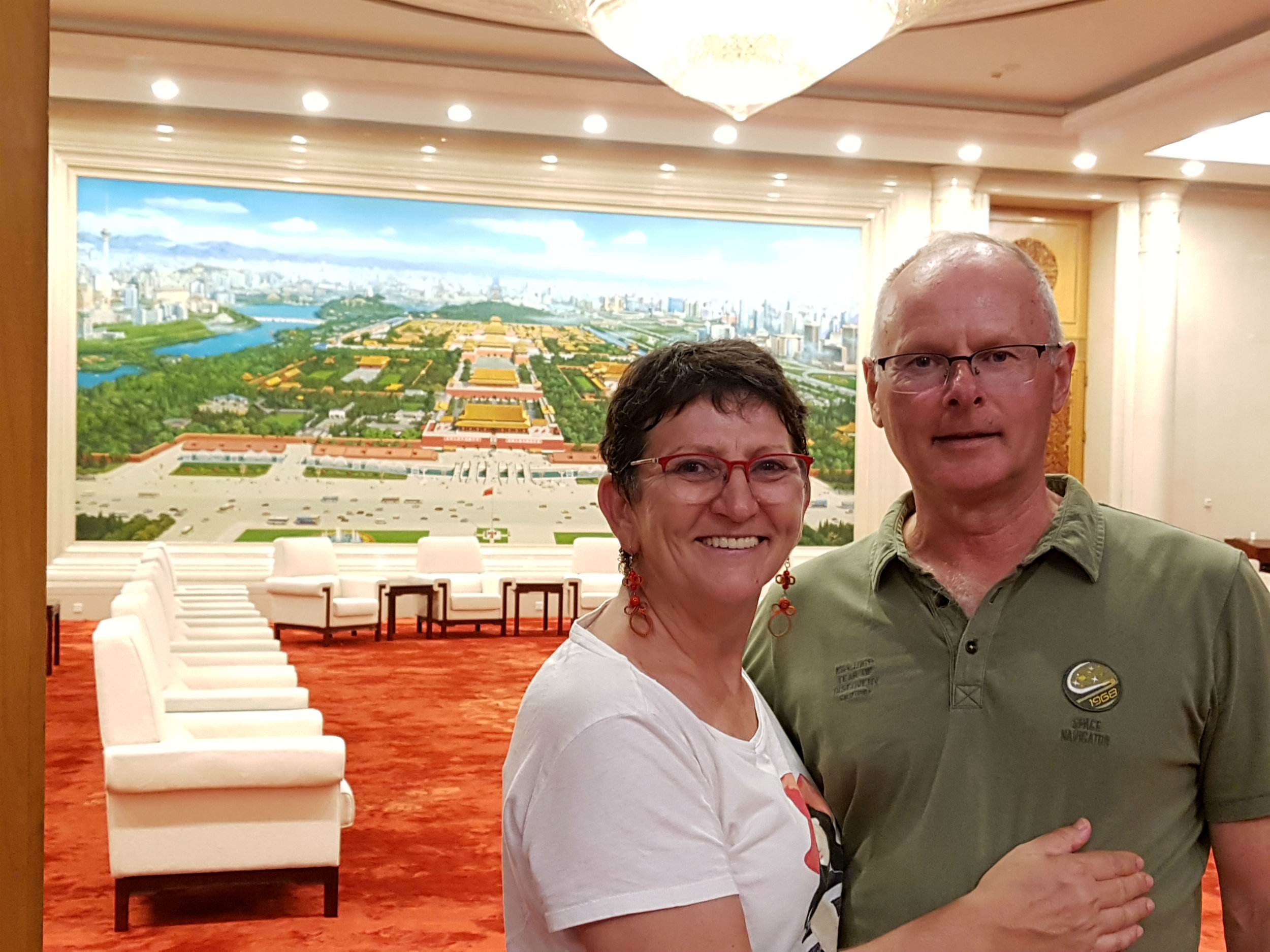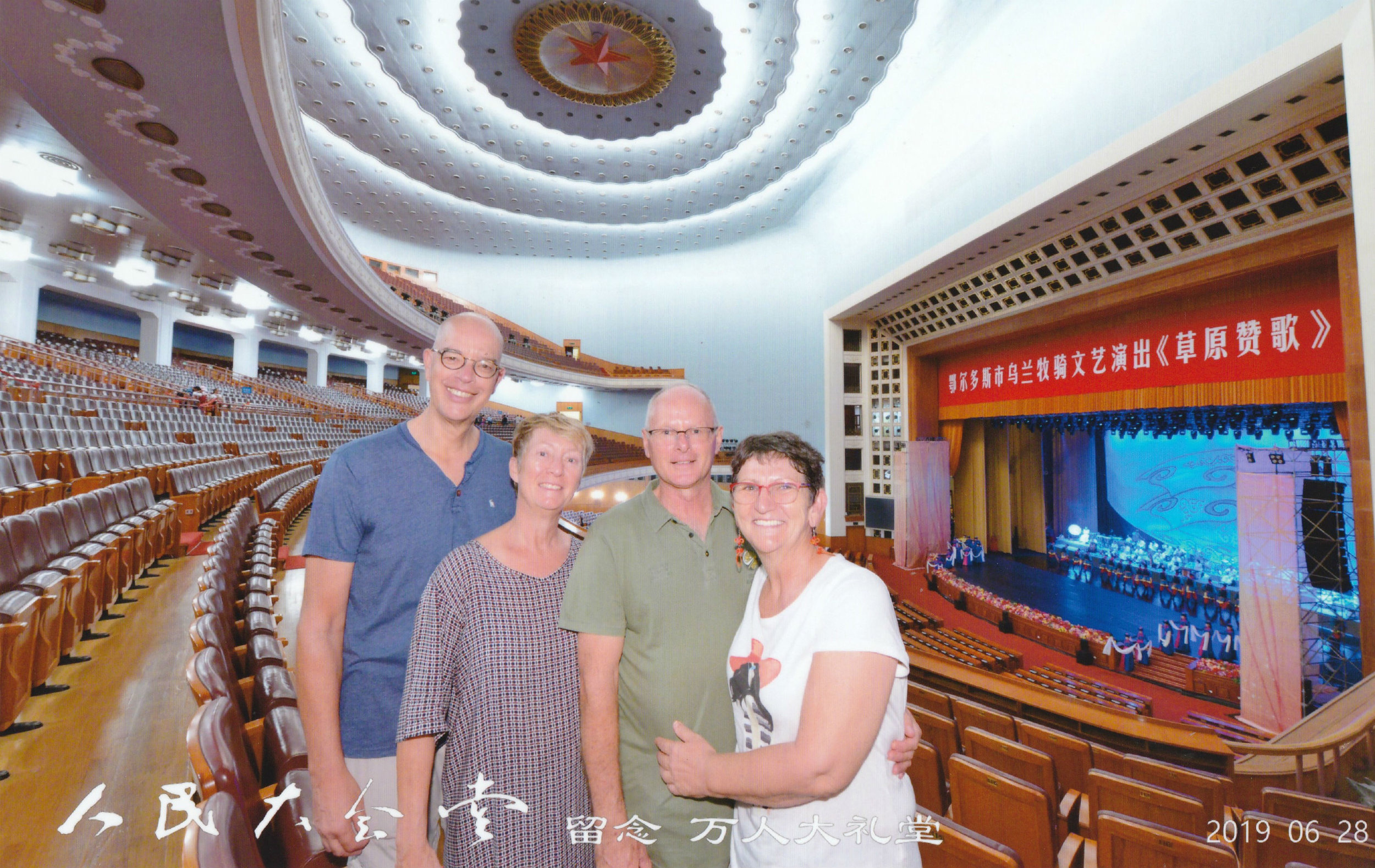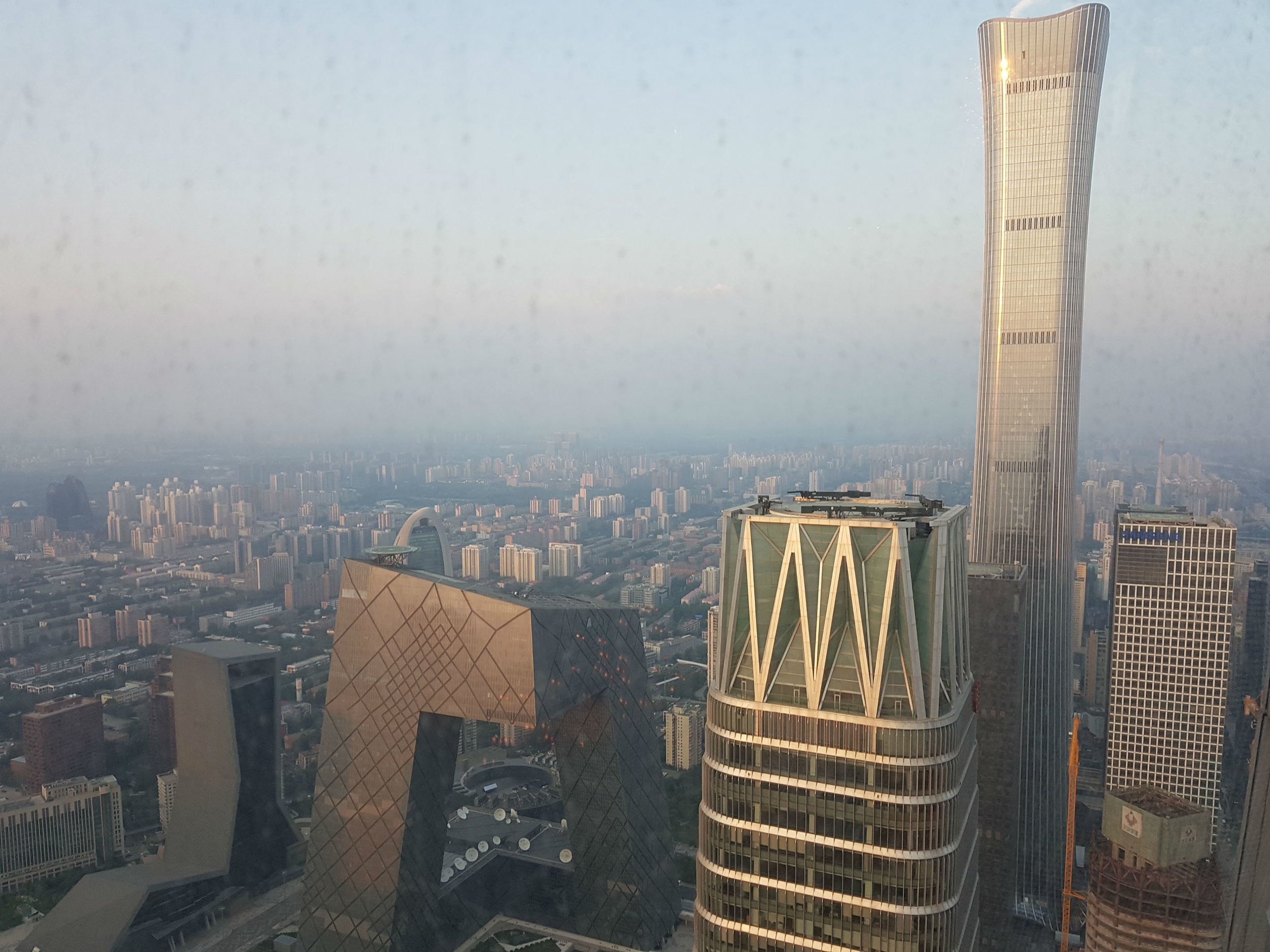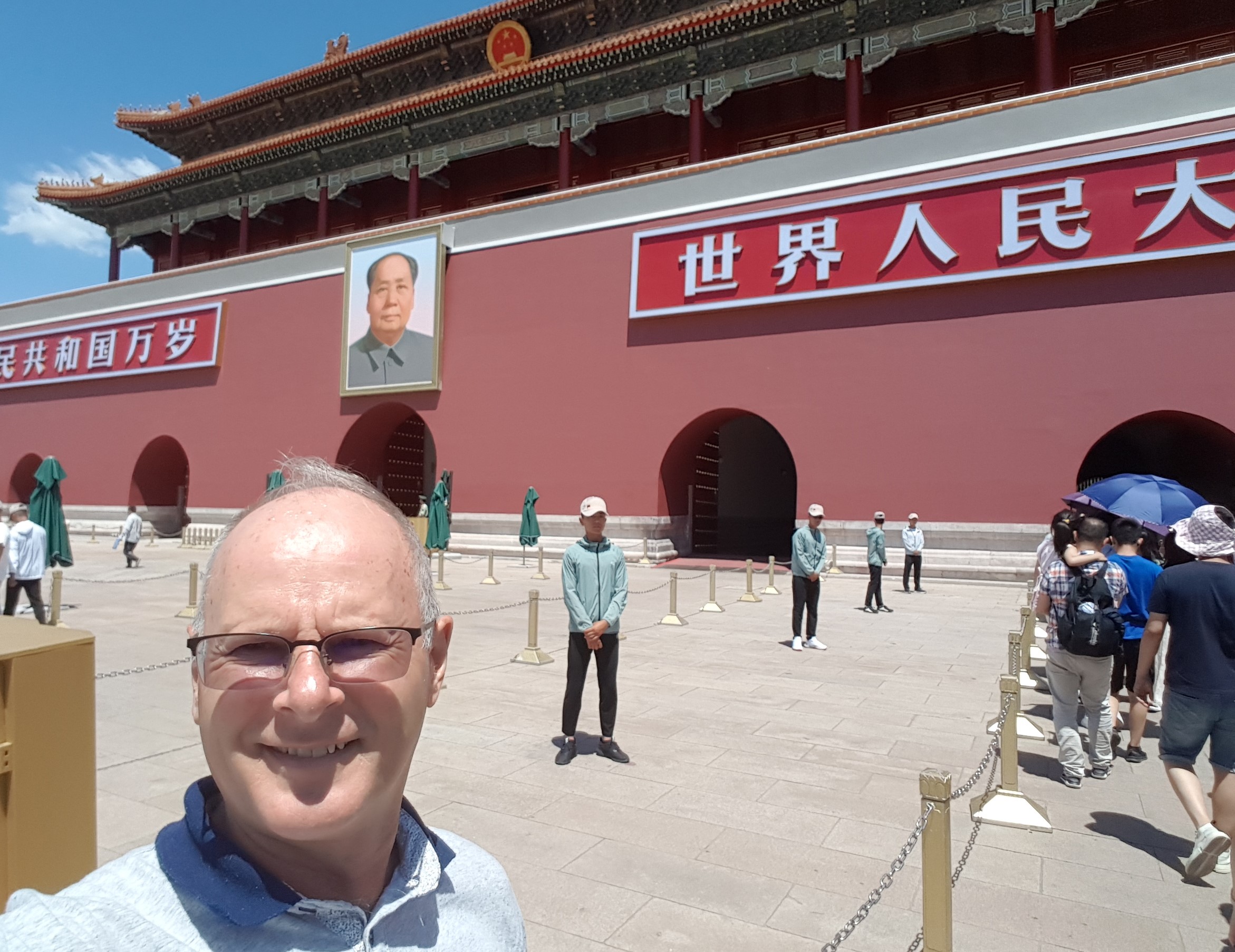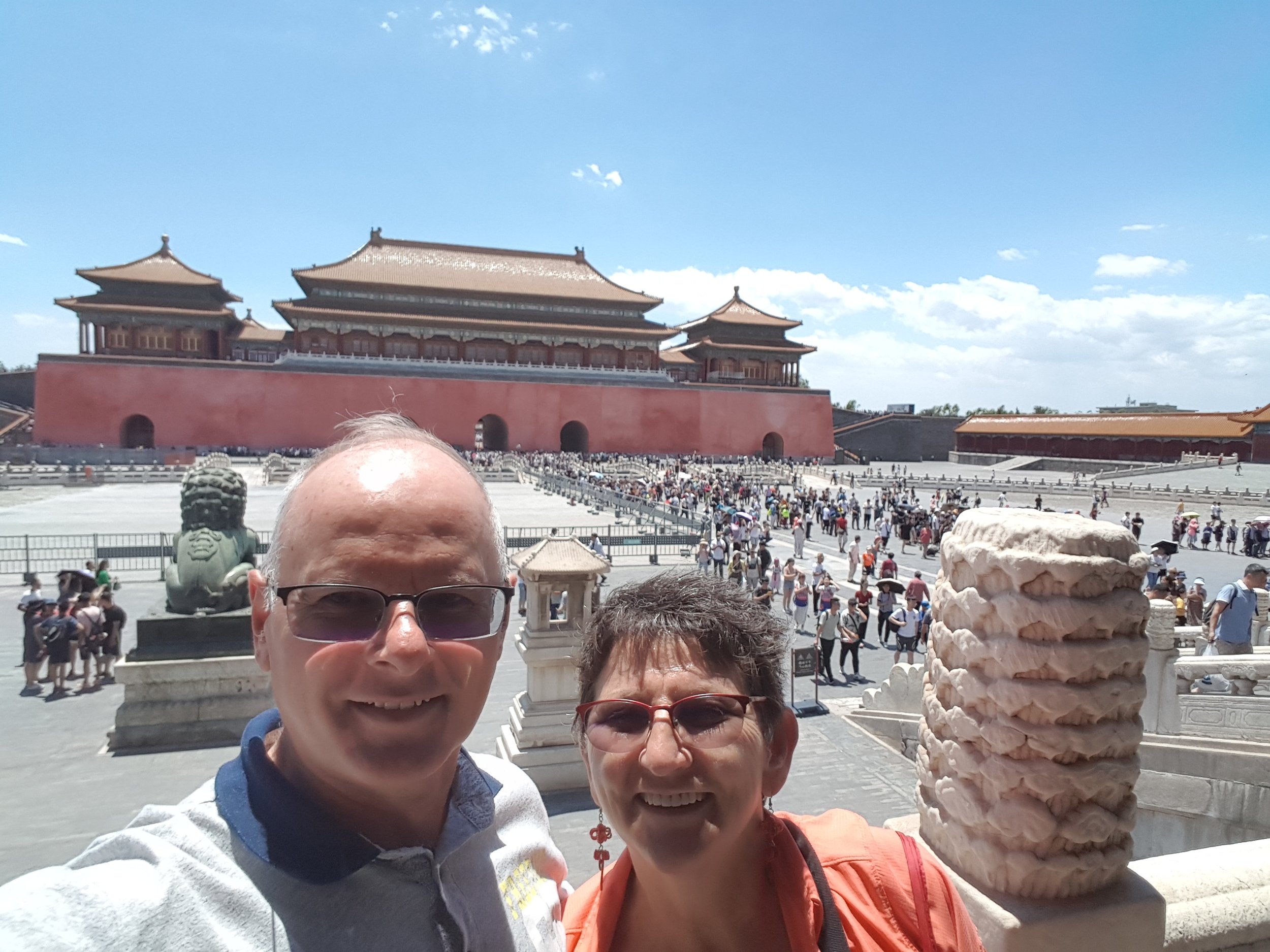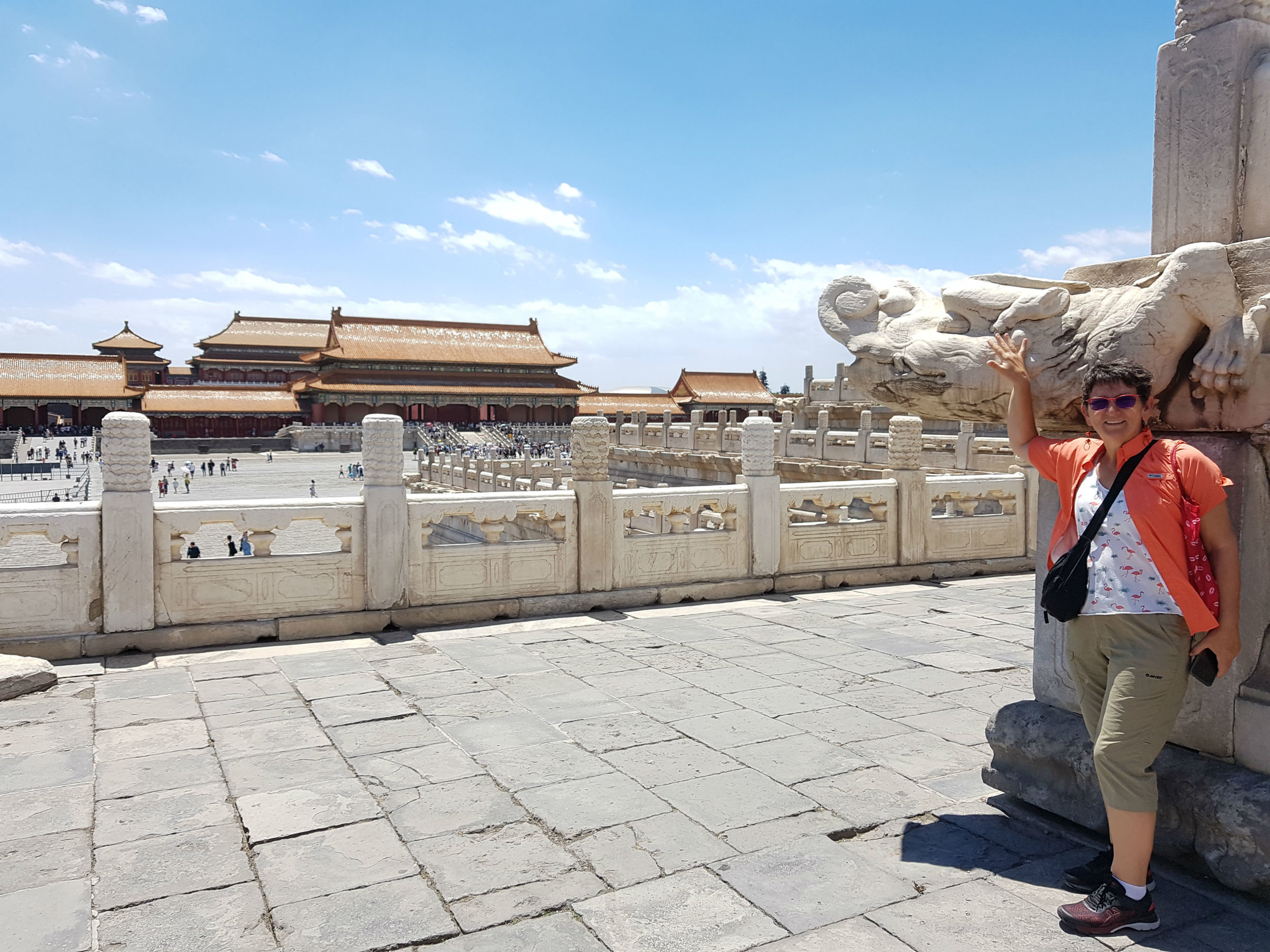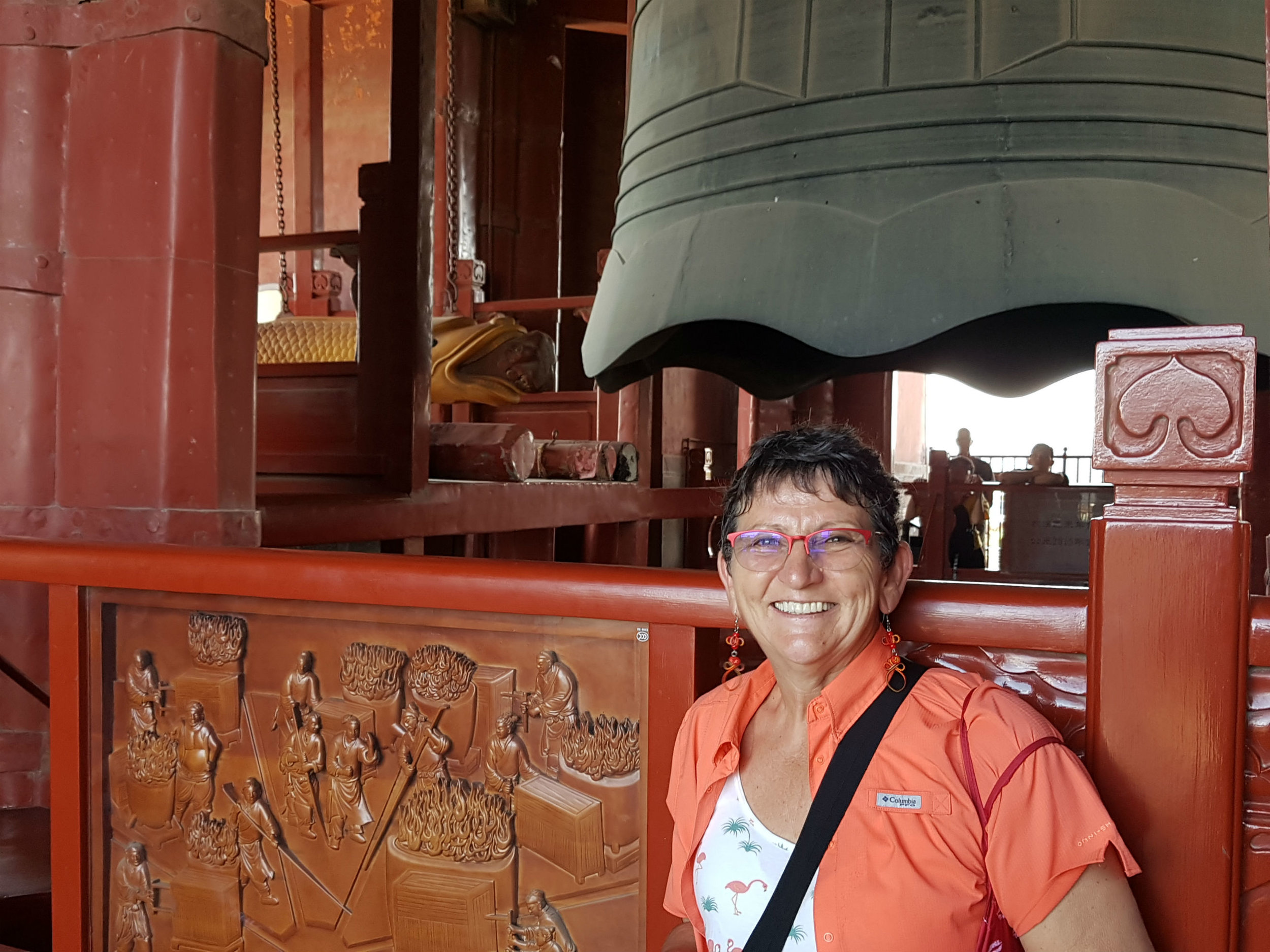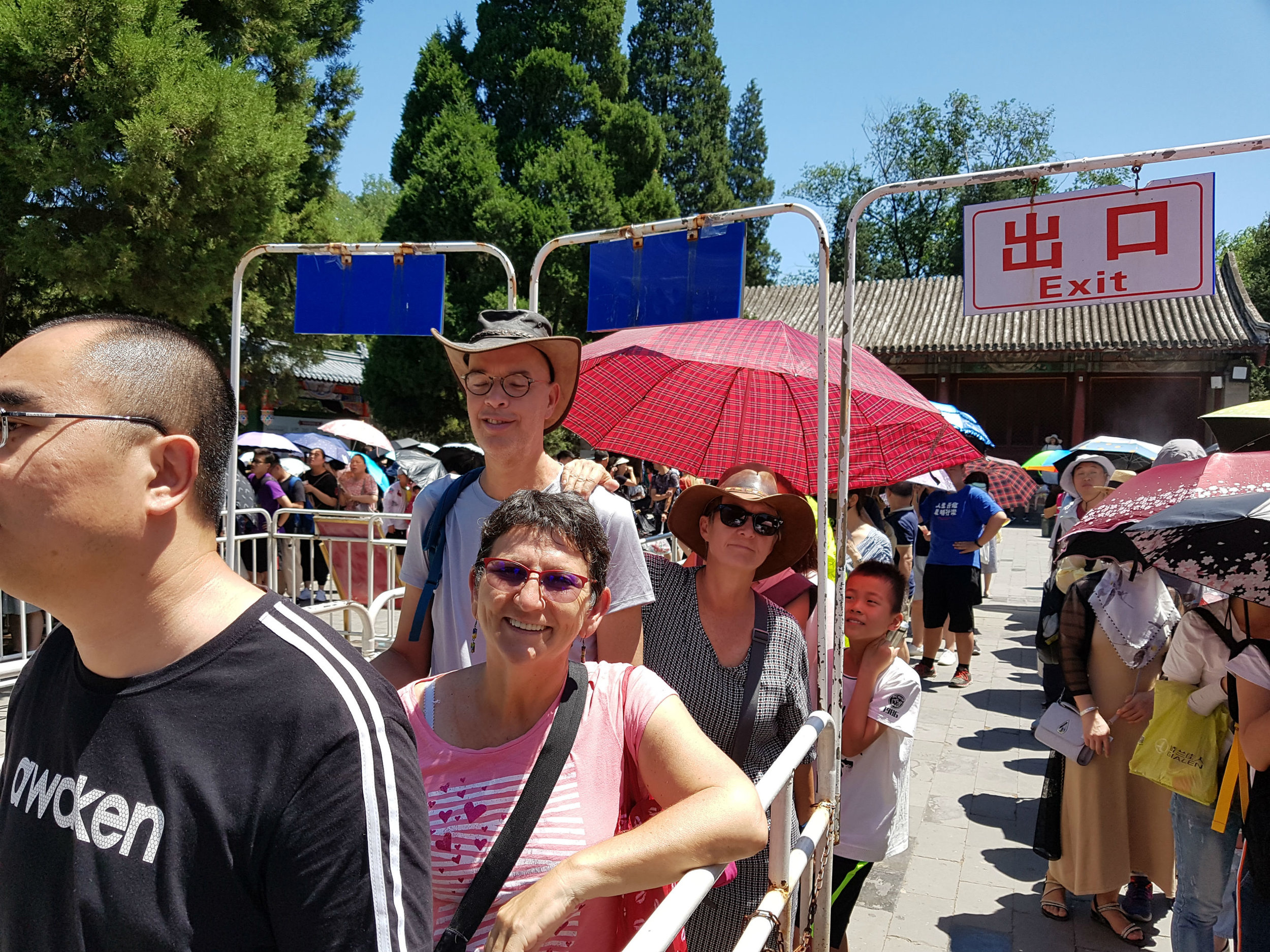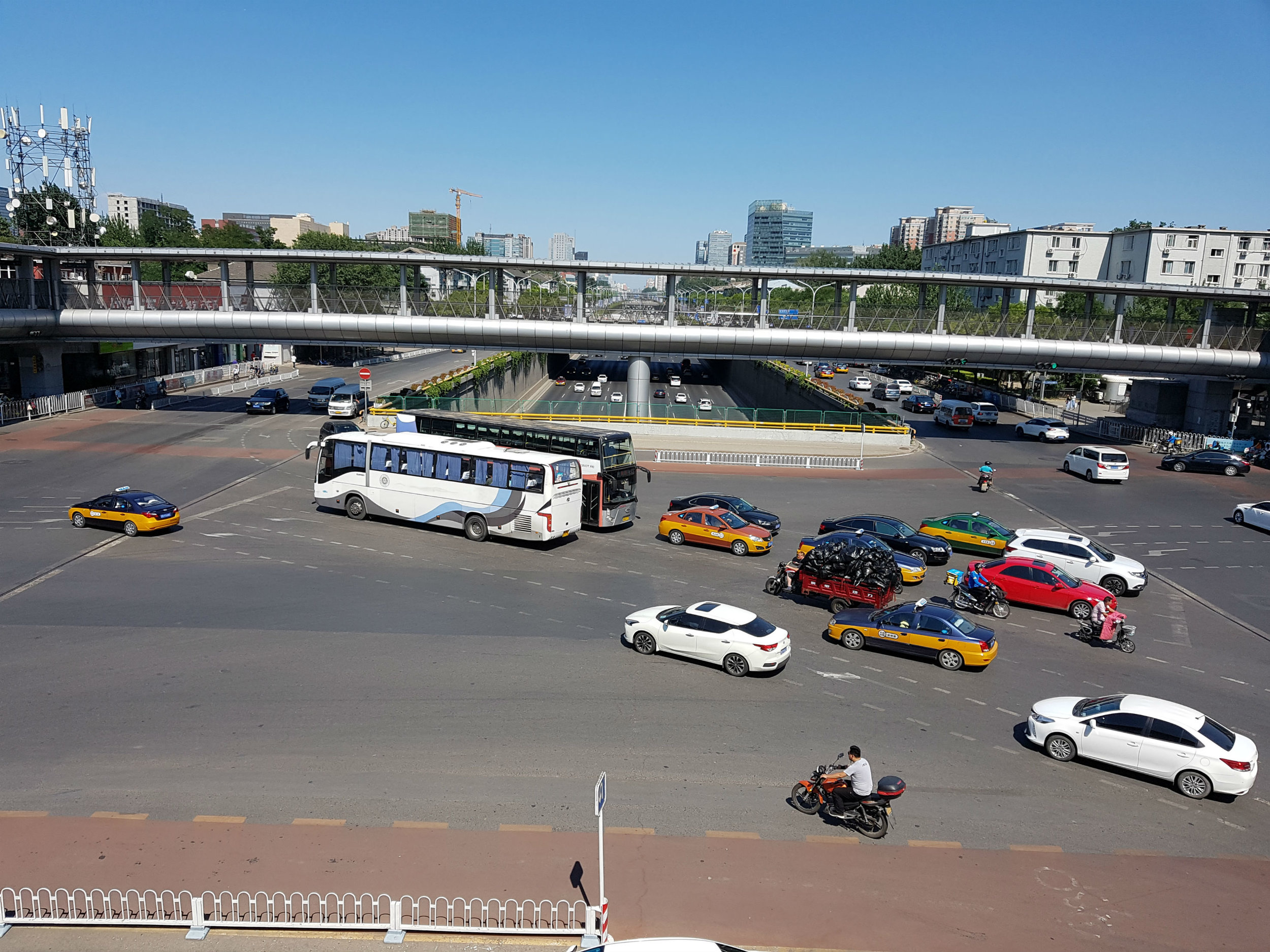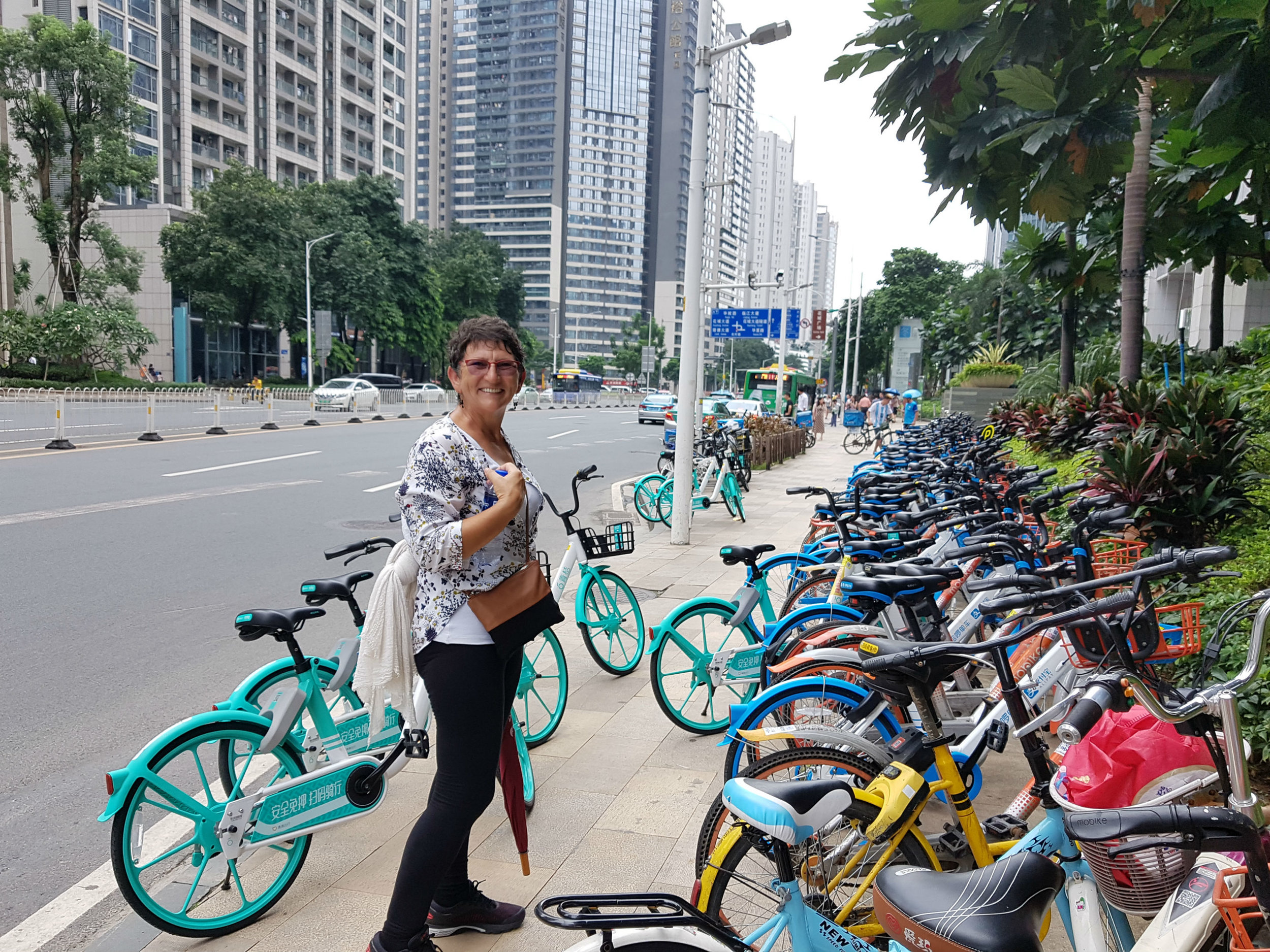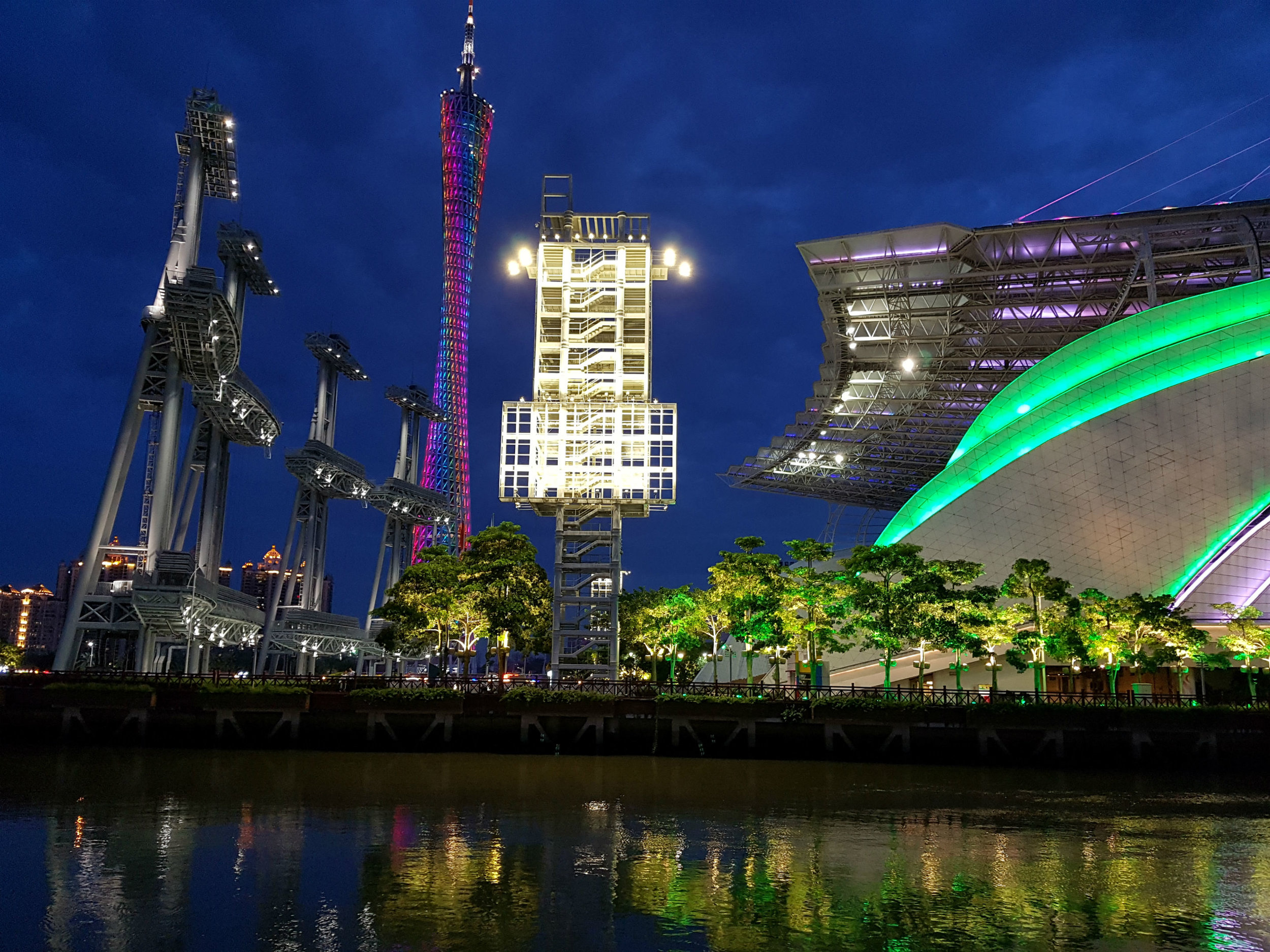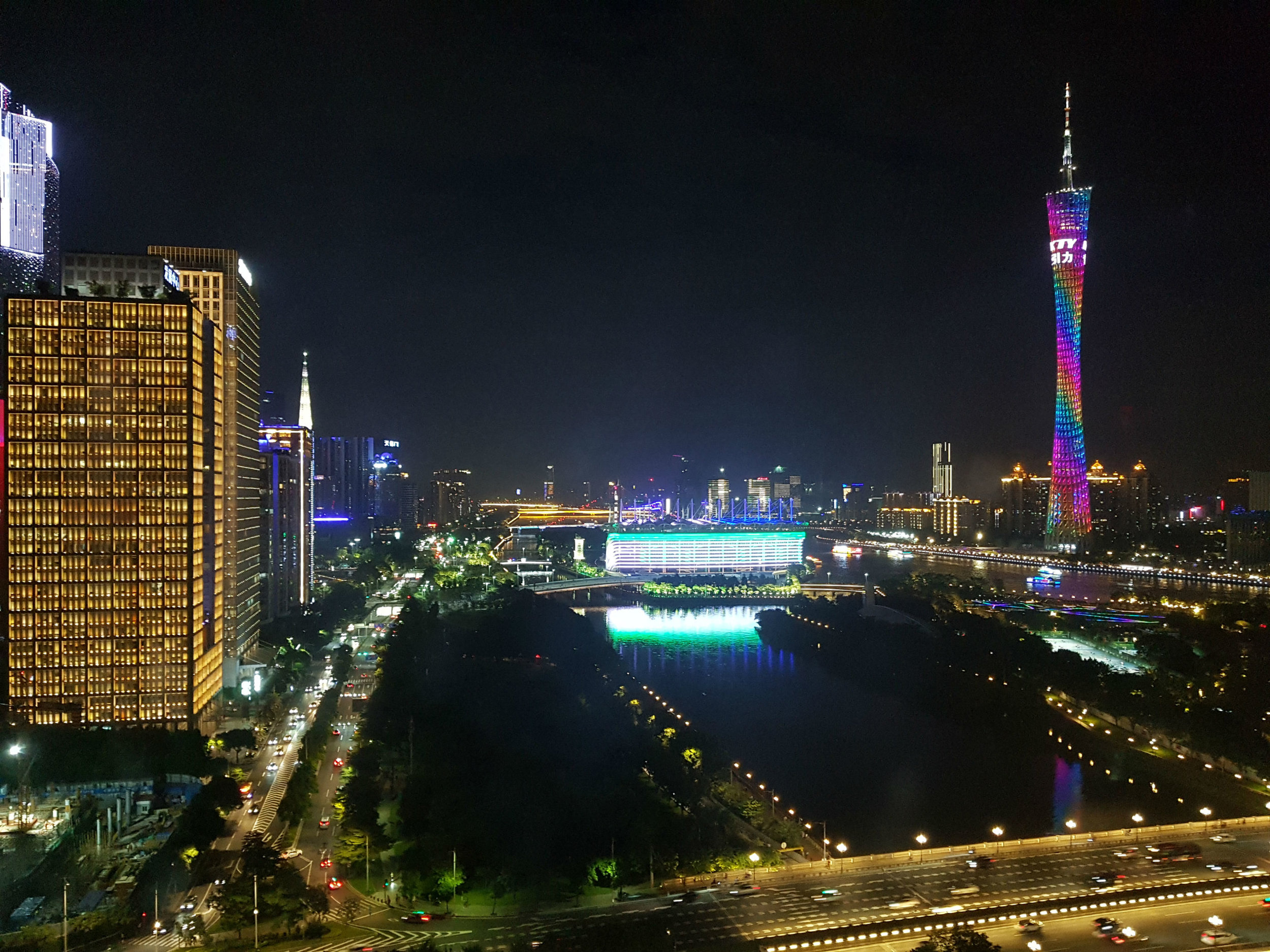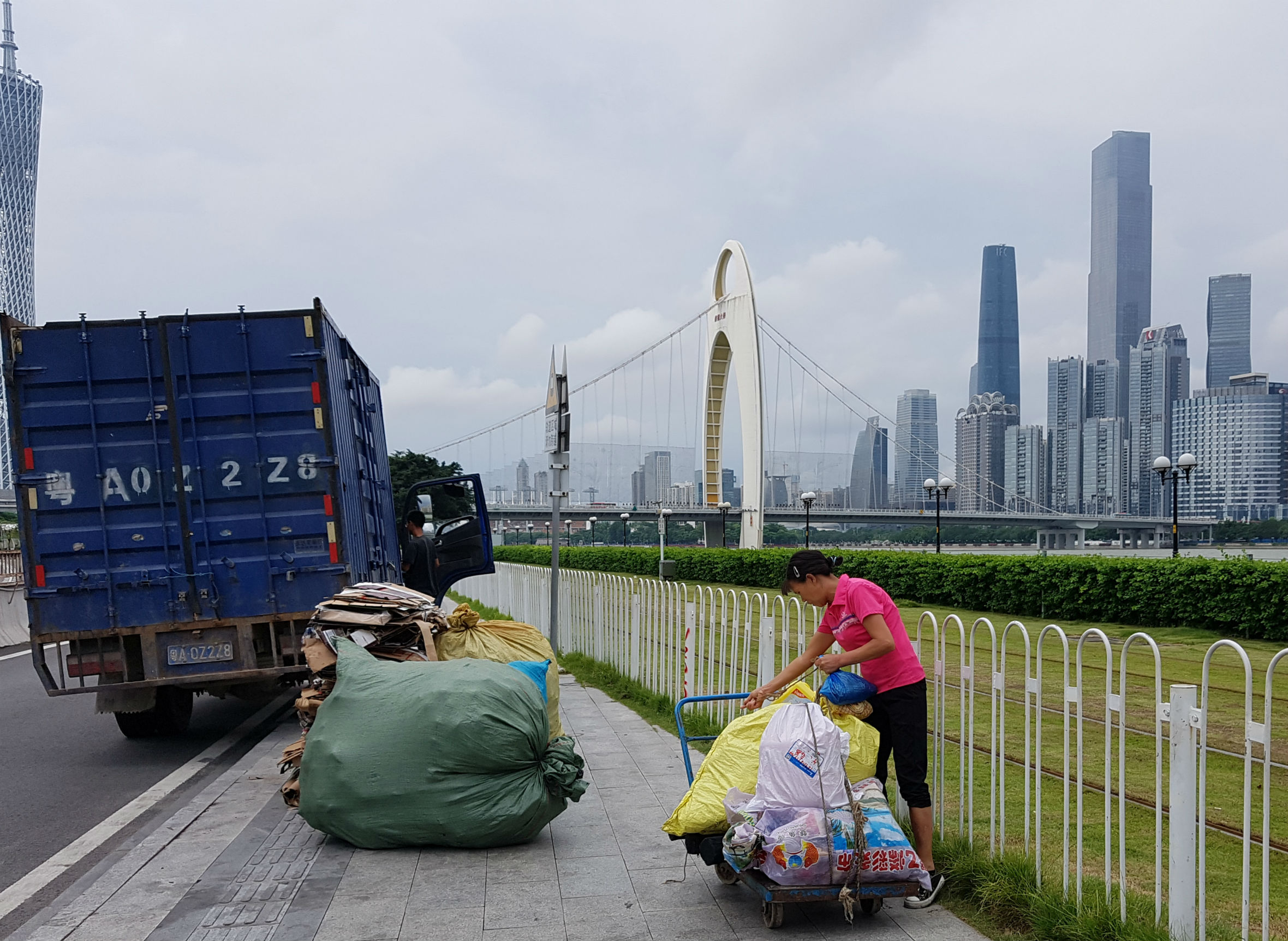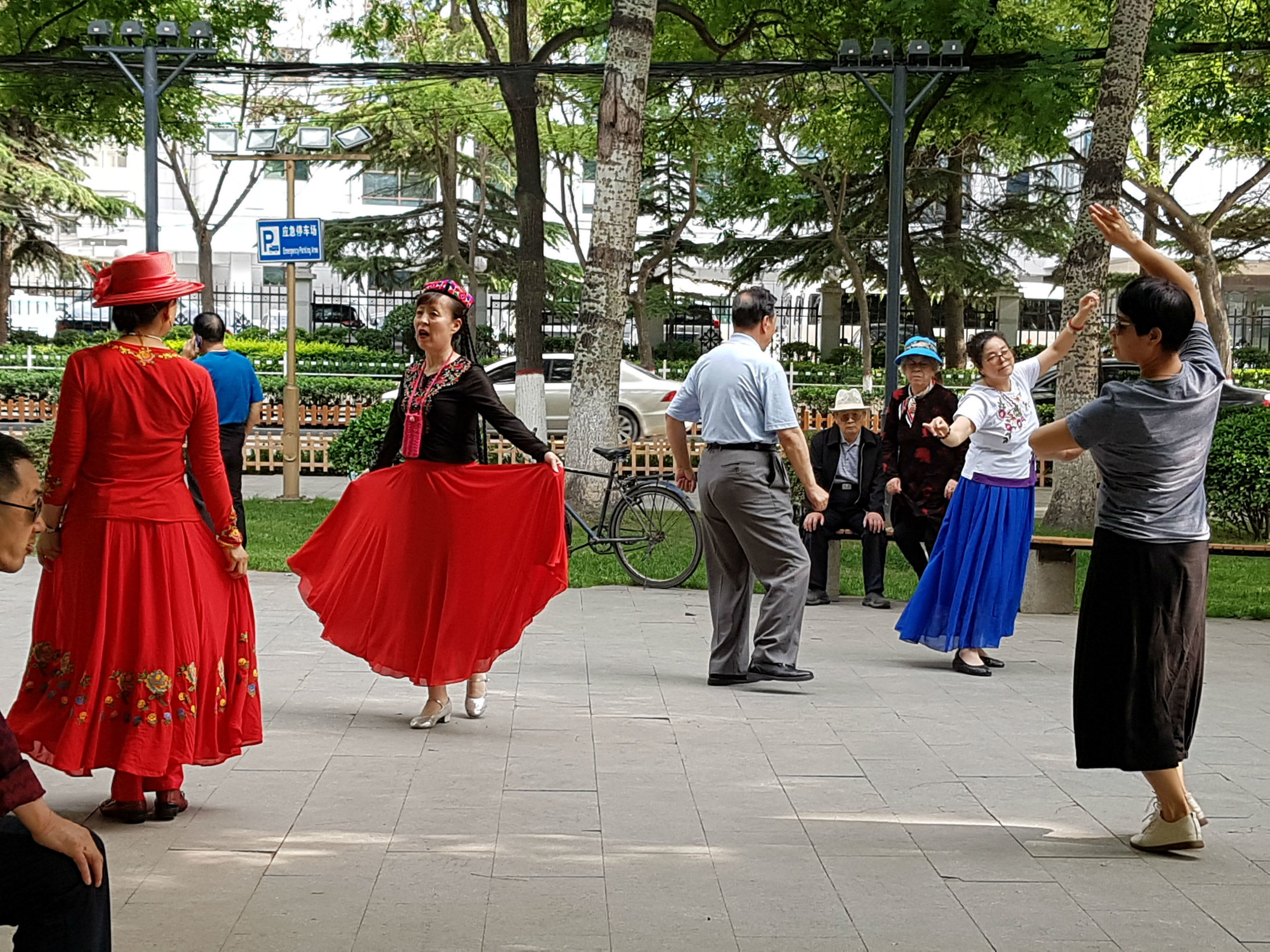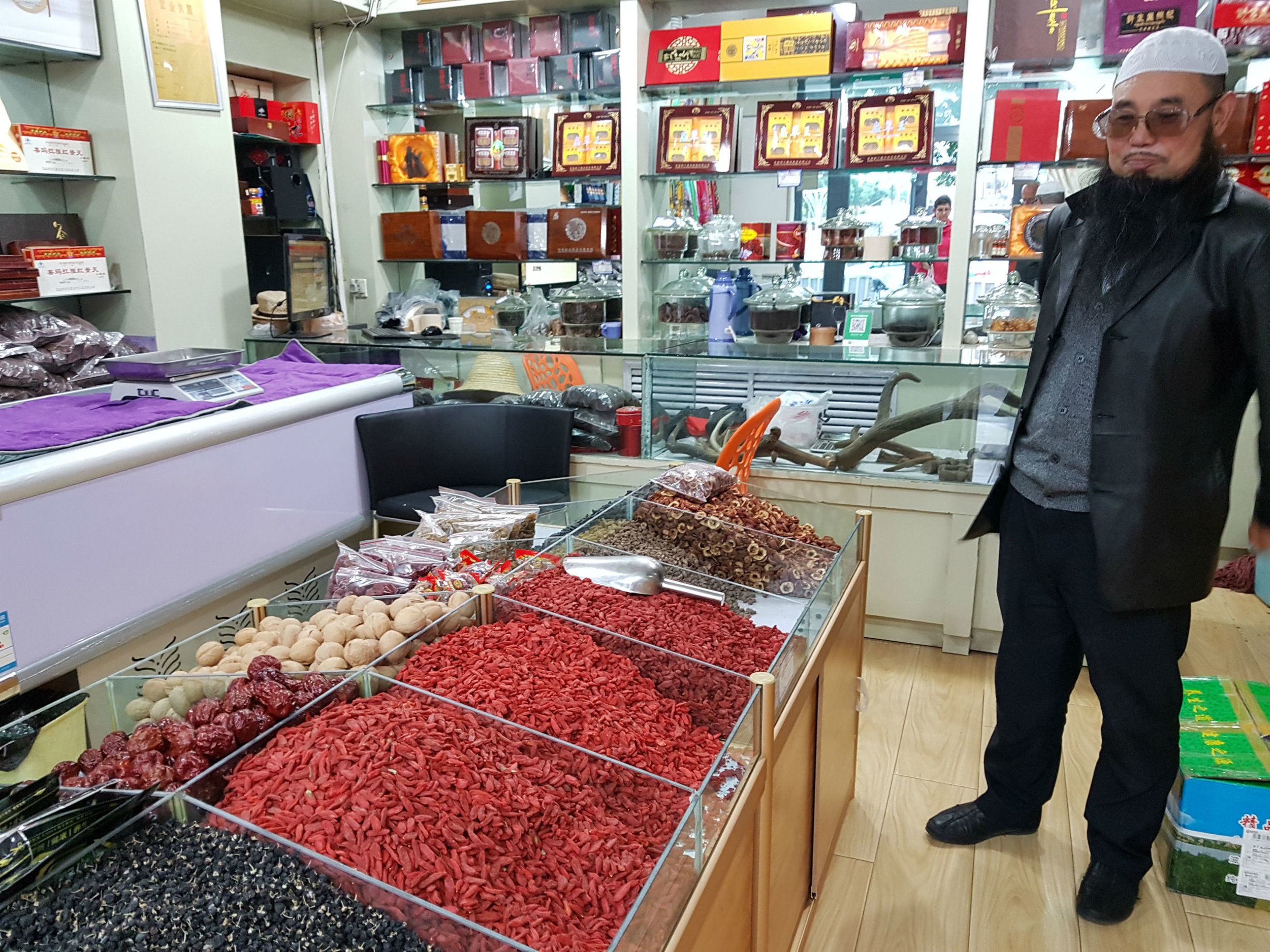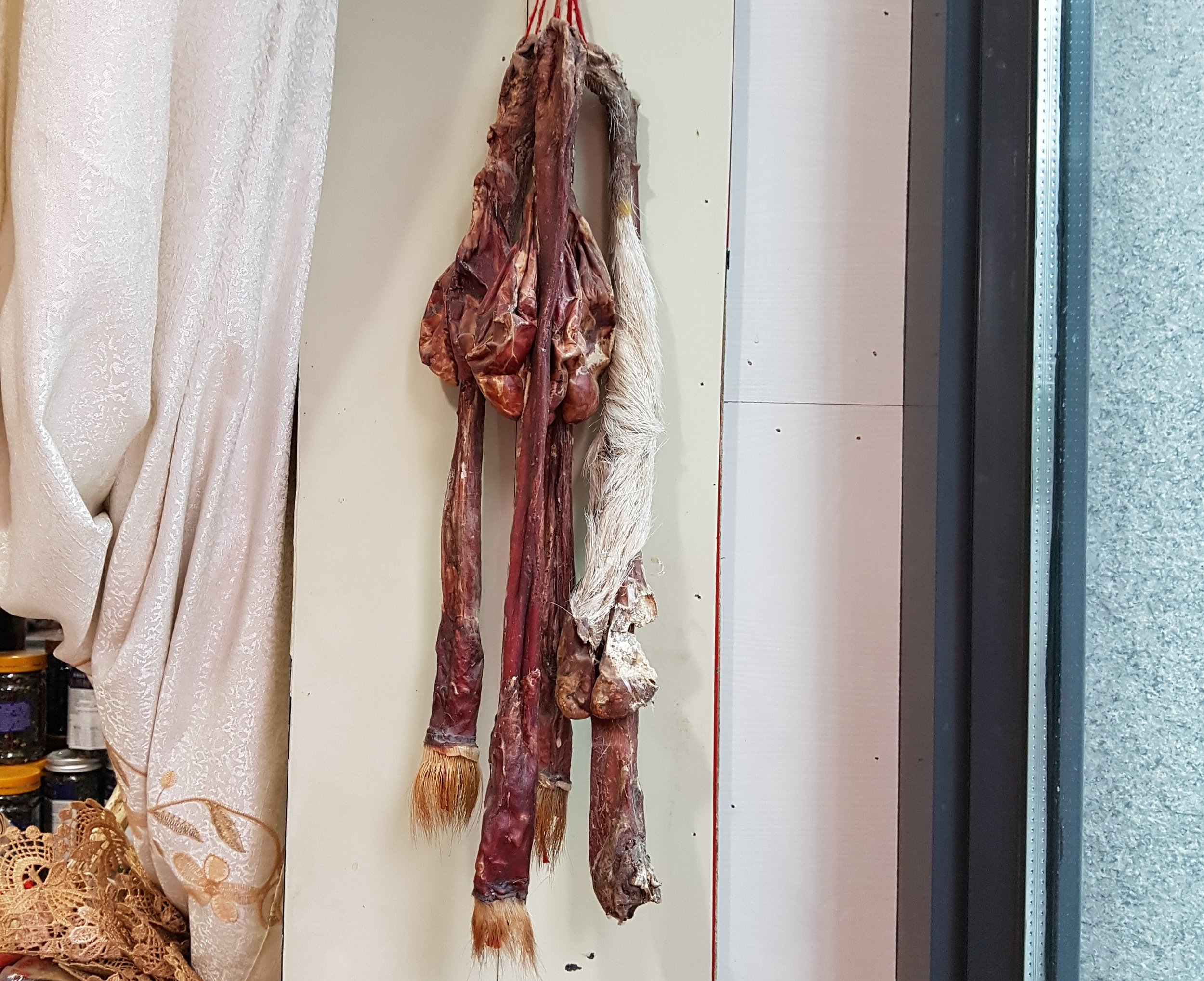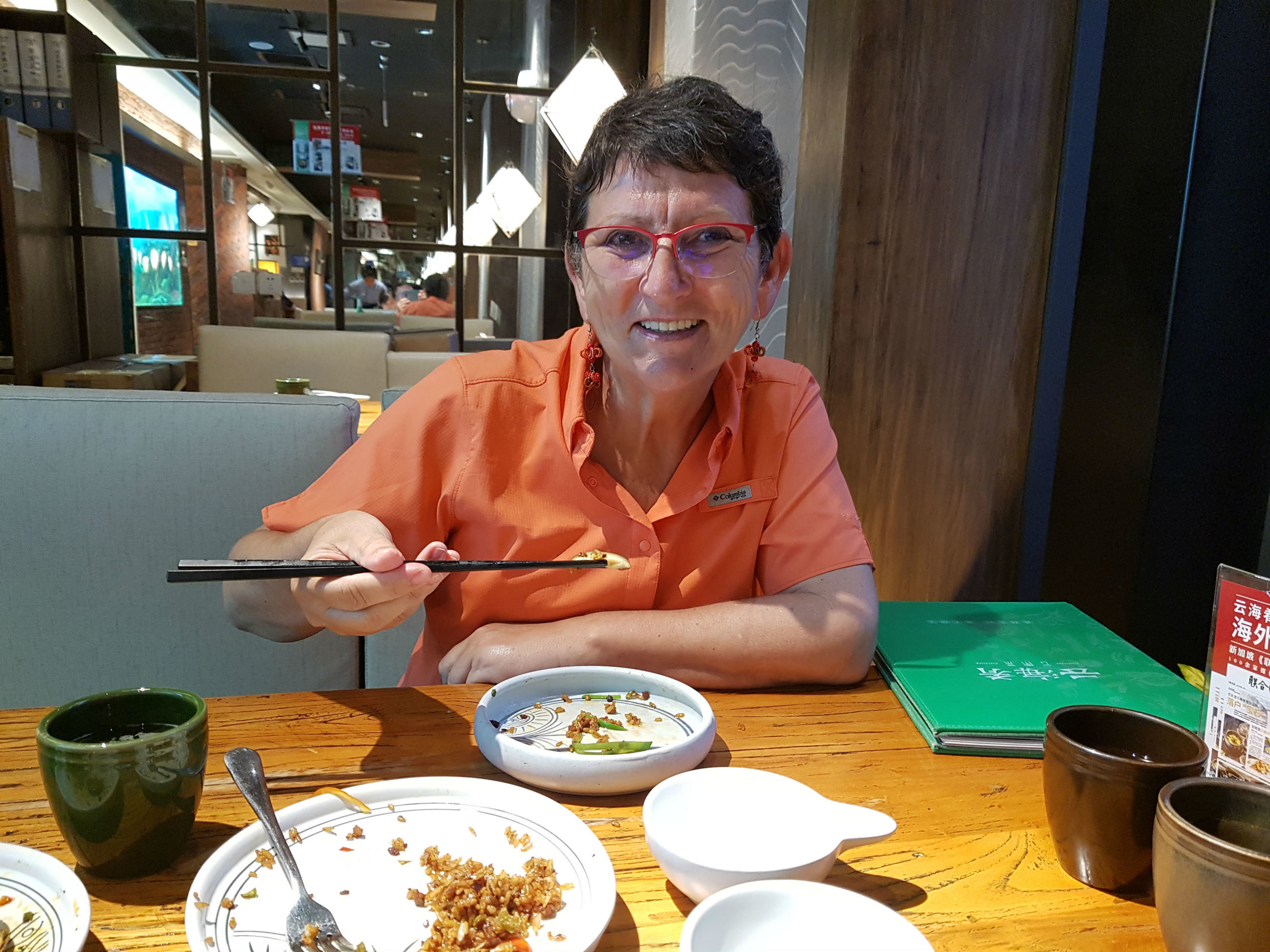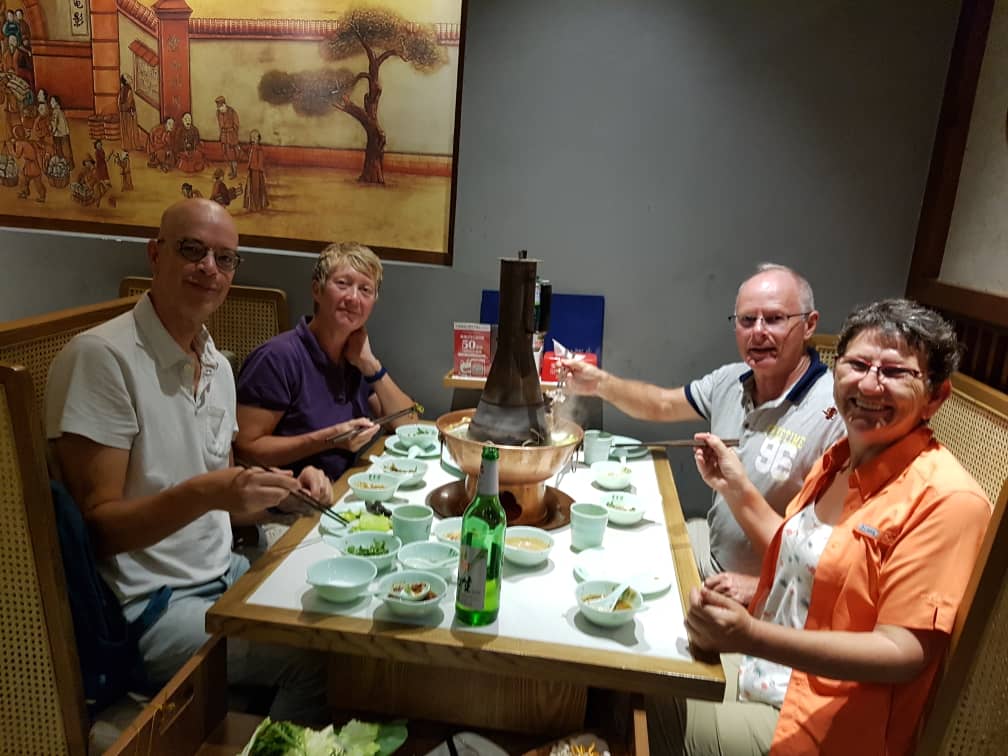Much has been said and written about this country, putting me in a dilemma to decide what to write about and what to leave out. I decided to focus on snippets of our first-hand more unusual or less mentioned observations and experiences. We traveled through this country of 1.4 billion people, which is still an enigma to many of us. Francien and I visited the cities of Lanzhou, Xining, Beijing and Guangzhou.
The inner Chinese flights were comfortable, punctual and we enjoyed good on-board service. On one flight just before the landing, the crew even bowed for the passengers too thank us for flying with them! The airports were well organized and airport employees and staff disciplined and engaged.
Same can be said about the train stations we have used. In particular the newly built high-speed train stations at Lanzhou and Xining not only impressive with their size (48 platforms), but also cleanliness and the futuristic designs. Taxi drivers never spoke nor could read English and therefore we always made sure we had our destination written in Chinese on a piece of paper for them to read. We booked our hotels on-line, which held whatever they promised on the booking site. In Beijing and Guangzhou we used the vast underground systems: easy to use, clean, punctual, pleasant. However, as seasoned travelers we knew the best way to better understand our surroundings is by walking and observing and that is what we did as soon as we arrived in the cities.
The omnipresent security measures were always in our face. The officials at airports and security check points and even the hotel staff meticulously checked everything, scanning our passports and visa’s, using facial recognition to verify our identity. When we entered the country the airport immigration officer kept checking a book in my backpack for improper content. I think because he could not read English he eventually gave it back and let me pass. Close to important buildings and squares, uniformed policemen stood guard, some held crowd control forks: two-meter-long metal poles with U-shaped prongs on the end, capable to pin down a person. (Similar as the 19th century man-catchers used in Europe to pull enemies down from their horses). CCTV cameras were everywhere on the streets, squares, parks and inside public buildings. To monitor vehicles, surveillance cameras were mounted above the roads and highways. And was this dash-cam in our taxi (pointing to the inside of our car) to check on the proper conduct of the driver or on us passengers? Yes, ‘big brother’ was watching. Mind you, everywhere we felt safe and secure.
The internet censorship prevented us from using any of our Google applications (e-mail) as well as Facebook, making us aware of how much we have come to depend on these. But our online translator worked very well, an excellent way to communicate with people. The language was a real barrier. English was sparse, also because for the most part Francien and I were the only ‘western’ looking people around. Although the locals went out of their way to help us, after a while we were tired trying to communicate with people who did not speak English. But it was us who had the problem: we did not speak Mandarin.
We learned that this country knows how to handle large flows of people: at security checks in busy subway-stations people were efficiently screened , ushers at bus stations would direct passengers to ensure quick boarding, uniformed officers always gave firm instructions to the people where and when to walk at crowded places. They have too. Cities in China have different dimensions as what we are used to in the rest of the world. This country has 15 cities with more than ten million inhabitants!
Take Lanzhou in the Gansu province in middle of the country. I never had heard about this city before (be honest, did you ever hear that name?). But with four million residents, it is larger than Paris, or Rome or Houston.
We stayed here three days and from our hotel room we had a birds-eye view of the Yellow River. This river had indeed a yellow appearance from the large amount of sediments it carries flowing down from the Tibetan Highlands.
One sunny morning we rented two bikes and rode along the river. Families strolled in the parks alongside the river. We saw people jogging, playing badminton, practicing Tai Chi and simply sitting on a bench. I saw more rental (e)-bikes than privately owned bikes, many neatly parked in dedicated spaces, connected to loading stations, all very disciplined. The city was clean, lively and pedestrian-friendly with excellent pathways, cycle-paths, road crossing. We did not see any western type of shops, except for one shopping mall. Here they had the same stores as in Kuala Lumpur or any other major city in the world. Like here, it's easy to travel the world and sometimes feel a bit at home, particularly if I am in one of the planet's 25,000 Starbucks cafes!
After a couple of hours traveling comfortably in a high-speed train, we reached Xining: 2.5 million residents! The majority of the people here belonged to the Muslim Hui’s, one of the 56 ethnic minorities in China. We strolled in the souks and visited the Dongguan Grand Mosque, built in 1380. I looked inside and saw men cupping their hands to their faces, praying as so many generations before them did. They wore white round head cups, many having a goatee. We saw old buildings, poor looking streets, smaller mosques, shops and apartment blocks. It appeared to be a joyless and drab place. People wore black and grey dull cloth. The black head scarfs the women were wearing caught our attention. The people had a darker complexion than the Han Chinese and were not used to see foreigners as many stared at us when we walked on the streets. In the evening we sat in a restaurant, each table was separated from the next by curtains or wooden separation walls. Thus, the women could take of their headscarves while sitting around the table without other men seeing them. That reminded me of some eateries in the Middle East. The next morning, we had tea for breakfast and looked across the street. In front of a fashion shop we saw a rather militaristic roll-call: the employees of that shop lined up on the pavement receiving instructions from their manager. After a few minutes they all erupted in synchronized physical exercises, following instructions from the same guy. After 15 minutes, they all walked into the shop and were ready to receive their first customers of the day.
On the outskirts we explored the Kumbum Tibetan Buddhist monastery. There were 3000 monks living in this vast 14th century complex. We attended a fire ceremony with chanting monks dressed in bright red colors. Francien and I enjoyed watching believers proselyting inside the many courtyards, yuan notes everywhere laying around as donations, reminding us of similar monasteries we had visited in Tibet. It was here in Xining that we noticed the cultural diversity of this country the most.
Beijing; 22 million people living here. After four hours flight Francien and I met up with our friends Pamela and Berry. The four of us stayed five days in a 10-bedroom hotel in the middle of a Hutong, a warren of hundreds of years old courtyard houses (in Imperial times, the people working for the Imperial Palace used to live here). The pace of life inside these neighborhoods was so much more relaxed and laid-back than in the more modern parts of the city. When we walked from our hotel to the city center, we saw people sitting in the narrow alleyways, playing Mahjong, chess or cards, fixing bikes, selling small household goods, or simply gazing at passers-by. Contrasting a 30 minutes’ walk towards the financial center of the city, we enjoyed the best view in town from the Shangri La Hotel roof top bar on the 80th floor. This ancient capital city now boasts big highways, futuristic skyscrapers, theaters and modern buzzing malls. Smartly dressed men and women rushed in and out of the office towers and Rolls Royce cars driving in the business district were prove of many serious rich people doing their business here. All this modern architecture mixed with the historical places like the Hutongs and numerous world heritage sites. Strolling through the city, again we saw only e-motor cycles and many rental bikes. We entered The Great Hall of the People on the Tiananmen Square and visited several halls representing each of the provinces in the country, uniquely featuring paintings, wall carpets and sculptures. It was impressive for its size and exuded a sense of power and respect. The broad streets gave us plenty of personal space and we only got to feel the crowds close and inside the Forbidden. Did I mention our visit to the Summer Palace? Here the term ‘over-tourism’ got new meaning. The entrance to this world heritage site was jammed with people waiting to get a ticket. Hordes of people looking stressed and exhausted due to the summer-heat, pushing and shoving in lines with no personal space left, umbrellas constantly poking in my shoulders, flag waving guides. Inside the palace people shuffled passed one another more concerned taking selfies than trying to take in the beauty of this ancient building complex. It seemed to me that many visited this place too be able to tell their friends ‘I have been there’, without knowing what was there. Any authentic feeling was stomped out by the hustle and bustle of the loud tourist groups. Alas, it took us 30 minutes to find the nearest exit and we were happy to escape this overcrowded place. This experience was disappointing, but our visit to Beijing was again fascinating.
“Honestly, I was most impressed by Guangzhou”
Have I said this is a vast country? It spans four times zones (but uses only one central time) and to reach our next destination it took another four-hour flight: Guangzhou 25 million people living here in the metro area on the Pearl River. This city (old Canton) was an important link on the ancient silk road with some 19th century colonial buildings still intact. Most emigrated Chinese people living around the world originally come from this region.
My most memorable observation here: the futuristic skyscrapers and bustling malls gave this city a modern feel. At night the skyline was illuminated with colorful lights and lasers: the 650-meter Canton Tower, the museum, opera house, the 100-story high International Finance Center tower, the bridges across the Pearl River. After a four hour walk through the city, we enjoyed our lunch on the 100th floor of the IFC, having this ‘feel good’ sensation. The streets and parks were clean, people nicely dressed and did not stare at us although we were the only westerners. But we also saw illegal migrants eking out a living with sorting and selling discarded plastic and paper, juxtaposing with the glitzy office towers. I saw fewer uniformed police, surveillance cameras and other security measures, feeling like a more liberal atmosphere. Honestly, I was most impressed by this city! Here again, everywhere the electric cars, buses and bikes showed not only this city, but this country is serious about tackling its environmental issues. However, the light haze we experienced in Beijing and Lanzhou proved they still have a lot to do. But they have come a long way!
Unfortunately, the difficulty with the language made it hard to interact with the people. When we entered a traditional Chinese medicine shop, the bearded owner tried to explain to us the health benefits but could only gesture with his hands and feet. Even using our electronic translator, he could not explain the benefits of consuming the dried penises (from deer) which were hanging on the wall or any other dried animal parts we could not identify. But in that traditional shop the products had a QR-code, so customers comfortably paid with WeChat: tradition met the future.
In a stuffy shop in Xining, parents of a six-year-old boy helped him to urinate in an empty food can on top of the counter: when we walked on the streets, we saw kids having their trousers slit in the back to help them going to the toilet; all behaviors of people who most likely only recently had migrated from the rural area’s into these cities, bringing with them old ways of doing things. (the last 30 years, 280 million Chinese have migrated from the rural areas into the cities)
Very much like Chinese tourist groups around the world, in China the locals also prefer to travel in groups, led by a flag waving tour guide. In the evening we enjoyed watching people dance in the parks, playing music and singing on self-made small stages.
From the moment we boarded the plane in Kuala Lumpur bound for China, being confined in the small space, we were confronted with the fact that Chinese people are hard voiced (sorry for again stereotyping 18% of the world population), in particular contrasting with the Malay we are used to who speak with a soft voiced lilt. This we would deal with during the entire stay in China, something we got used to after a few days.
Forget the myth that the Chinese people are yellow: they are as light colored as Francien and myself. What did we eat? Dogs and snakes, right? NO, we ate hot pot, delicious noodle and rice dishes. In a Tao Tao Ju restaurant (a traditional tea house) we had Cantonese breakfast. Yes, in the train we saw a woman sharing a bag of boiled chicken feet with her family and in a hotel in Lanzhou there was pork ears in fat on the menu, but other than that we haven’t come across food which we rather would not eat.
The people were friendly and helpful. In Lanzhou we walked through the city and could not find the shortest way to a bridge crossing the Yellow River. We approached a traffic police officer and to our surprise he did spoke a few words English.
‘What is the shortest way to cross the river?’ I asked him.
‘Where are you from?’ he asked politely.
‘Oh, Holland – Orange!’ he replied when I told him. He pointed to the other side of the avenue.
‘Come and stay close to me’ he gestured to us. One look at the traffic told me it was too dangerous to cross, but without even looking, he stepped onto the busy five-lane avenue. His uniform was enough for the rush of cars to immediately stop, letting us cross without a hitch.
‘Continue walking on this side and you will get to the bridge. Have a nice day.’ the friendly officer said when we arrived on the other side.
Visiting another country always shoots down preconceptions which we all have and even though this was our second journey here, we were once again impressed with what we had seen and experienced. If nothing else, Francien and I have learned that this intriguing country is on the move and has a lot to offer to the rest of the world.


